#then 30% is going to 'win the poll' even though it is the minority.
Text

somebody needs to teach this website what the difference between a majority and a plurality is. like, right away.
#if 30% of people don't do drugs and 70% of people select from a long list of options which all involve doing drugs.#then 30% is going to 'win the poll' even though it is the minority.#i have seen this so many times and it makes me insane.
126 notes
·
View notes
Text
Voting Yesterday = Success! and Pissed-Off Fundies! via /r/atheism
Voting Yesterday = Success! and Pissed-Off Fundies!
Summary of a day-long, "I'll be damned if the Geriatrics outvote people who will actually be alive to see the consequences of those votes!" Elections Crusade.
Our polling places here are mostly schools and churches, mine being the church only a few blocks away. I was there at 6am, voted, went out for breakfast and to meet up with friends after they'd voted, and then it was Action Time.
11 of us drove all over, picking up and taking Voters who needed rides, to their polling places. Our state is quite hard on businesses that don't allow their employees to go vote, so we spent a particularly large amount of time, going into stores, offices, etc, flashing our State's Voting Statues at managers, and hauling people who I KNOW wouldn't have gone otherwise, to their polling places.
Now for the Religious Part: Honestly, it wasn't terrible! Sure, there were the typical Zealots out by the road where they "technically" were allowed to be, shouting their doomsday nonsense, their "save the kids!" nonsense, and the anti-youth vote nonsense. But it wasn't terrible.
The only issue we ended up having, was when we stuck around outside explaining to first time voters that, "Splitting the Ticket" is a decades old tactic the loud minority (we weren't allowed to use Party Names) uses, to ensure that if they couldn't win the Top of the Ticket, they'd at least castrate that Candidate's power in office by filling the lower seats with (the opposite party) candidates.
We kept using the School Boards as the example: "If you Elect (Party) at the top, then allow the loons to take the school board, how is the Top Ticket guy supposed to protect and fund education?!" You'd be shocked how many people, new voters AND life-long voters, didn't realize this.
The Elections Overseer said we were well in the clear on what we were saying, BUT these insane Fundies kept bitching and bitching that we were "Pushing Our Agenda" because "They know who we're talking about, even if we don't say their name or Party"
They got loud, and somehow WE got moved to the side... Still got the message across though!
I got home at 8:30, after taking my last carload of voters back to Applebee's where they work.
In all, I'd say it was successful. my town, and the surrounding 4 towns all did pretty well voting in Sane candidates, and rejecting / removing the Crazies. There were a few nutters who got in, but with Majorities secured, they can vomit their filth all they want, and be silenced by Logic, Reasoning, Common Sense, and Science!
(For those in Ohio, THANK YOU for freaking voting! Those numbers had me on the edge of my seat for a while! You done good!)
Submitted November 08, 2023 at 09:51PM by Last_Eggplant3277
(From Reddit https://ift.tt/cU37FZz)
0 notes
Photo

Owen Strand Screen Time Meta Post
Welcome to the first in a series of posts analyzing the screen time of characters post season 2 of 911 Lone Star. I thought this idea would be more interesting, and efficient, than trying to put all of my thoughts for every character, and the entire season into one post.
First up is Owen because he’s the highest billed character and because when I put out a poll, he was the only character no one wanted to see first. So let’s dive in!
Read my analysis below the cut:
Season 1
I’ll be honest, when I started calculating the screen time I had no idea how much of an impact Owen’s time would have on the fandom. I really don’t recall there being that much discourse over it until I posted the results... and it didn’t really bother me before I saw the numbers? But after I did that first episode I was like oh..... yeah that’s a problem.
At least that pilot episode was the most screen time he’s gotten, though I’m willing to bet that will change with season 3′s “Owen Begins.” I mean in a way, the pilot episode was his begins episode (or could even be considered “Begins Again” like what they did with Bobby on 911) since it was about him packing up and starting a new life as captain of the 126. Essentially, the pilot episode served to set up that this would be Owen’s show.
The other episode where he took up a larger chunk of the screen time was 1x06 (”Friends Like These”) which makes sense because it was exploring his friendship with Billy... little did we know how important that would be later.
Most of his screen time in season 1 was concentrated around 8-10 minutes. Obviously that is the most screen time given to a character on the show, which makes sense since the show and the character was written for him and he hold the executive producer title.
The least amount of screen time he got was around 7.5 minutes in 1x03 (”Texas Proud”) and 1x08 (”Monster Inside”). I do find that especially interesting since those are still episodes where he played an important role in the plot, compared to other characters whose least amount of screen time meant they were lucky if they spoke one line. It’s also worth noting in 1x03, Owen still had the most screen time (though Michelle was a close second) and in 1x08, Michelle did beat him by a few minutes.
Season 2
We really went into season 2 with higher hopes, though it wasn’t much better (I would argue there was some improvement... but I’ll talk about that more later).
It says a lot that Owen’s top 3 episodes are 2x10, 2x11, and 2x12. Though he didn’t beat his previous record of over 20 minutes, he got nearly 15 minutes in 2x11 (”Slow Burn”)... which if you didn’t already know, is also the episode that was written by his son, John Owen Lowe, and directed by his brother, Chad Lowe. He also got around 12 minutes in the two episodes that buffer that one, 2x10 (“A Little Help From My Friends”) and 2x12 (”The Big Heat”). This three episode arc accounts for about 32% of his screen time this season.
Before that major arc in 2B, in the first half of season 2 his big episodes fell around 10 minutes each; 10:45 in 2x07 (”Displaced”), 10:00 in 2x03 (”Hold the Line”, the crossover), and 9:45 in 2x01 (”Back in the Saddle”)*
A big difference for this season compared to season 1 was that there were episodes where he did not get as much screen time. Whereas his least screen time was 7:30 last season, this season there were four episodes that were lower than that; 7:15 in 2x06 (“Everyone and Their Brother”), 6:00 in 2x13 (”One Day”), 5:30 in 2x02 (”2100°”), and of course, a mere 1:00 in 2x09 (“Saving Grace”). That is really the only episode where Owen has completely stepped aside, playing a very minor role in the overall plot. In 2x02, 2x06, and 2x13, Owen came in second behind Tommy (in x02 and x13) and Paul (in x06). And in 2x09, he came in fourth (the only time thus far he was not in the top 3) behind Judd, Grace, and Tommy.
(*I’ve mentioned the new method I’ve been using to calculate screen time on a few occasions now and I’ve only revisited 2x01 so far (almost done 2x02 tho) anyway, I’m using the data I collected using the old method for these posts but in an effort to be totally upfront about how the new method is going, Owen’s screen time for 2x01 is actually about 30 seconds higher than I originally calculated, coming it at 10:15 instead of 9:45. Not much of a difference, and idk how much the rest of the new method results will impact this meta post, but I wanted to be clear about it).
Total Screen Time
As the infographic above states, his total screen time for the two seasons comes in at nearly 3 hours and 45 minutes. Divided in half, thats around 112 minutes per season, which does fall in line with the totals for each season (103.25 minutes for season 1, 120.5 minutes for season 2). However, there was only 10 episodes in season 1, compared to the 14 we saw in season 2. With that in mind, you can begin to see how season 2 was actually a smidge better than season 1 when it came to how much screen time was given to Owen. But the real indicator is the averages, which is discussed next.
Average Screen Time
As you can see in the infographic, Owen’s average screen time in season 1 was around 10:15 and dropped to 8:30 in season 2. The series screen time (which is the total divided by 24, not those two totals divided by 2) comes in at about 9:15.
Obviously, even 8.5 minutes is still a huge amount of screen time. But compared to over 10 minutes in season 1, his average screen time is seeing a clear downward trend. I would take this as a win. It’s a small change, but it’s an indication that we are heading towards a day where Owen doesn’t eat up the majority of the screen time each episode.
Outliers
The idea of outlier episodes wasn’t even something I considered until a few weeks ago. This would be an episode where the screen time total was either much higher, or much lower than what is normally seen for that character.
According to my calculations, in season 1 the pilot episode at 20:45 is an outlier for Owen. In season 2, 2x09 (”Saving Grace”) is also an outlier at 1:00. And looking at the data set for all the episodes in series, both numbers (20:45 and 1:00) are outliers. (Outliers change based on the data set, so we need to look at each data set (season 1, season 2, and series) individually and not assume that an outlier for one season would also be an outlier for the series).
What happens when you remove the outliers?
That brings us to the above question. Is Owen’s 20+ minutes in the first episode the reason why his time is so high in season 1? Is his 1 minute in 2x09 bringing down his time in season 2? And what about the series?
I’m not sure if it’s worth examining how the totals are affected since that’s pretty self-explanatory. Obviously all the totals will go down if you take out the outlier episodes. But where it makes a difference as far as we’re concerned is the averages.
Obviously the average number is how much you should expect to see that character during an episode. But if 20 minutes is much higher than normal, and 1 minute is much lower than normal, then what happens when you take out those numbers? Well, something actually fairly interesting happens, that almost contradicts what I said before about the progress...
When you remove the pilot episode from the data set for season 1, the average comes to around 9:15. When you remove 2x09 from the data set for season 2, the average comes to around 9:15. When you remove both episodes from the series data set the average comes to (you guessed it) 9:15.
9:15 is more indicative of what to expect for Owen’s screen time in an average episode, and since it hasn’t changed that says a lot about the progress we’ve seen for screen time distribution.
Now as for what to do with this? Honestly, I have no idea. I mean the fact is that while these episodes are outliers, they did still happen. There is an episode where Owen only had about a minute of screen time; just like there’s an episode where he got over 20 minutes. Outliers are weird because I don’t want to not acknowledge them, and I think it’s important to look at when studying the screen time as a whole. But as for the reported numbers, we can stick with what is laid out in the infographic.
Closing Thoughts
It’s hard to say whether this season saw less Owen, or about the same. Of course when taking all episodes into account, it is less. But when you remove the outlier one minute episode, it’s really not that much better. But then again, the fact that we did get an episode where he was only on screen for a minute is a very good sign, so taking it out of the data set doesn’t exactly make sense.
I guess the biggest takeaway still is that Owen still has a lot. He always will. Even if he did have less this season, it’s still much more than the characters who come in second and third had. I like to think it will get better, and maybe it will, but personally I’ve accepted that Owen will always have the most, and he will have much more than other characters, but it shouldn’t be as much as it is. Hopefully his screen time will continue to trend down and allow for more time to explore the other characters on the show.
62 notes
·
View notes
Text
SnK Episode 61 Poll Results (for Manga Readers)

The poll closed with 359 responses. Thank you to everyone who participated!
Please note that these are the results for the Manga Readers’ poll. If you wish to see the results for the Anime Only Watchers’ poll, click here.
---
RATE THE EPISODE
347 Responses
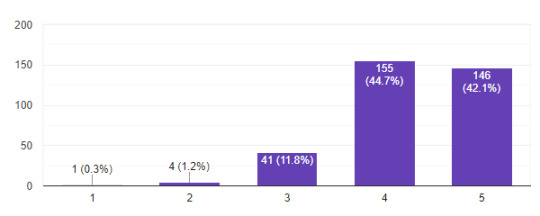
While this episode wasn’t as big of a hit as episode 60, overall most viewers still enjoyed the content and are looking forward to more next week!
amazing amazing! I'm so delighted with this season so far!
Im so beyond pumped i love everything
Dissapointing but acceptable.
I’m like angry I loved it so much.
I just wish we didn't have to wait a week
It was amazing. We all gotta apologize to MAPPA for ever doubting them.
It's a huge stepdown from episode 1. At times the animation was straight up painful to watch. My expectations were low and yet I'm still disappointed :/
WHICH OF THE FOLLOWING WAS YOUR FAVORITE SCENE/MOMENT?
349 Responses
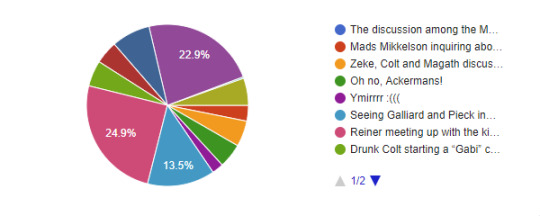
Reiner-centric scenes were the highest on people’s radar, with 24.9% of respondents enjoying his reunion with the warrior cadets, and not far behind, 22.9% enjoyed Reiner bringing up the 104th at the dinner table. In third, with only 13.5%, was Pieck and Porco’s formal introduction to the audience.
Hearing Zeke greet his grandparents with such happiness warmed my heart. I do believe that he loves them.
They just had to add one last image of Ymir's broken face before she died, huh? :(
WE FORGOT TO ASK LAST WEEK D: WHICH OF THE FOLLOWING SCENES/MOMENTS FROM EPISODE 60 WAS YOUR FAVORITE?
348 Responses
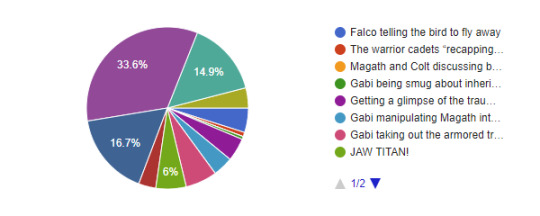
Last week we forgot to include what your favorite scenes were. The scene from episode 60 that got the most favor was Reiner’s, “I’m sick and tired… of walls” with 33.6% of the vote. 16.7% most enjoyed Zeke’s titan transforming scream. 14.9% were hyped about Reiner and Porco wrecking Fort Slava.
MAPPA WENT ALL OUT WITH THE CINEMATOGRAPHY IN THIS EPISODE. WHAT DID YOU THINK OF THE CINEMATIC PANS AND ROTOSCOPE ANIMATION?
349 Responses
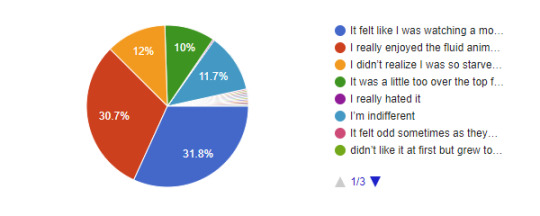
Overall, a total of 74.5% respondents have positive feelings about MAPPA’s use of rotoscope animation and camera panning. Some felt like it was akin to watching a movie, while others are just happy to have the dynamic movement. A smaller amount of respondents didn’t have feelings one way or another, and a minority (about 10.3%) really are not a fan of this type of animation style for the series.
It felt odd sometimes as they used it for long scenes (like Udo talking or Gabi telling the story to her family) but overall it was pretty great and I prefer it to WIT's stale animation during season 3
I liked the more dynamic movement during dialogue, but my roommate found it super awkward and off-model. So a fifty-fifty split in a sample size of two lol
It could have been animated better, but I like the extra dimension it gives to scenes
Enjoyed it a lot! However, there were a few scenes that felt a bit off, like some frames were missing. Specifically, when Udo was doing all those gestures while talking with the rest of the Warrior Candidates.
It felt dynamic to the point of looking unnatural - some gestures and expressions just moved wrong
i'm split, in some scenes it was great (like reiner waking up), but in the dialogue scenes the constant movement seemed kinda unnatural and distracting
It was amazing but at the same time I'd didn't look fluid enough, especially at Udo's mouvements which made the character look kind of...video game-ish in constant moving.
I thought it looked great the rotoscoping,the movements all looked amazing
The animation during Urdu’s scene is so cool! I was caught of guard at first though lol. It’s so realistic!
NOW THAT WE’VE GOTTEN TO HEAR A LITTLE MORE OF THE NEW OST TRACKS, HOW DO YOU FEEL ABOUT THE SOUNDTRACK SO FAR THIS SEASON?
344 Responses
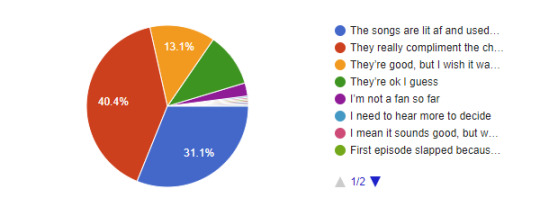
So far, reception to the newer music is overall positive. 31.1% are really enjoying the music and think the songs are being used immaculately, and 40.4% really feel that the song choice compliments the scenes they’ve been used in. 13.1% think the songs are good, but miss having that sole Sawano feel to them. 10.8% just feel the music is “ok” and 2.6% aren’t a fan of the new OST tracks so far.
I mean it sounds good, but we haven't gotten to important moments that require a memorable track, so we'll see!
First episode slapped because it really complemented the scene but it's more... generic. I didn't like how it was used in this episode, there wasn't enough of it and again, generic. I miss Sawano's unreal scores.
the animation absolutely blew me away, and i love the intense music that played during Reiners monologue
The music is fine.
I've heard both new and old songs from the previous seasons. Still too soon to make an opinion as we need to hear more.
I am deaf, I can't hear no damn soundtracks
That music guys when they came back to Liberio and reuniting with they parents, made me tear up but also because the scouts never had the chance to go back home with victory in the arms of their family, I wish I could have seen EMA like this..
It kinda felt unfair X) but I was happy for them nevertheless.
HOW DO YOU FEEL ABOUT THE CLOSEUP OF ZEKE’S MOUTH?
346 Responses
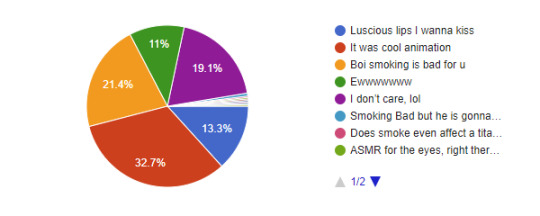
Our first of probably too many crack questions in this poll, 32.7% thought the closeup of Zeke lighting his cigarette was cool looking. 21.4% are concerned about Zeke’s lung health. 19.1% are probably annoyed with us and simply don’t care (lol). 13.3% wouldn’t mind smooching Zeke, and 11% were just plain grossed out.
Does smoke even affect a titan shifter? Surely his lungs just heal themselves
ASMR for the eyes, right there. Aww yiss
It was awesome! Zeke is shown as relaxed person with a big drop of mystery.
Smoking Bad but he is gonna die in a year anyway
Suuuuuuucc
It might've just been an artistic choice to include it in there, but i gotta say I'm oddly fascinated and idk why
I don’t remember it lol
I didn't even notice.
Zeke looks hotter than he has ever looked
WHAT’S YOUR OPINION ABOUT ELDIAN ASSES?
341 Responses
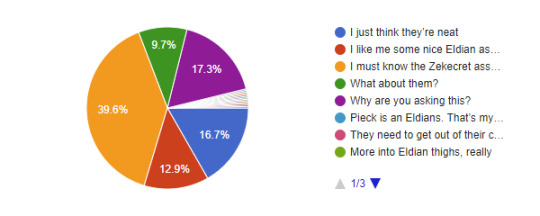
Most of the responses seemed to feel rather positively about Eldian asses, with almost 40% seeking out Zeke’s ass wiping technique. About 17% simply stated their appreciation for them, while almost 13% are just thirsty. In contrast, a little over 17% seemed confused to the question’s inclusion and about 10% were confused outright.
MAPPA WHERE IS PIECK'S ASS
More into Eldian thighs, really
I bet Levi’s is nice
If only Eren had one
zeke has the energy of a straight man who doesn't wash his ass
Only Shadis' ass
GIVE IT TO ME 😏😏
They are like normal, human asses. Do not turn them into some magical, special snowflakes, just because they belong to Eldians.
Seek help
Enough
DO YOU WANT REINER TO GIVE YOU A HEAD PAT?
343 Responses
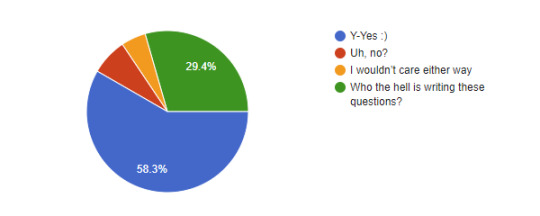
A definitive majority, almost 59 percent, openly expressed enthusiasm for the prospect of a head pat from Reiner. However, a near 30% fraction of responders didn’t seem too happy about this recent chain of less than serious questions. We’re sorry about that. 😅. The rest either didn’t seem interested in said prospect or noted they wouldn’t care either way.
WHAT DO YOU THINK ABOUT THE DECISION FROM MAPPA TO CONDENSE REINER’S FLASHBACK INTO (PRESUMABLY) A SINGLE EPISODE?
346 Responses
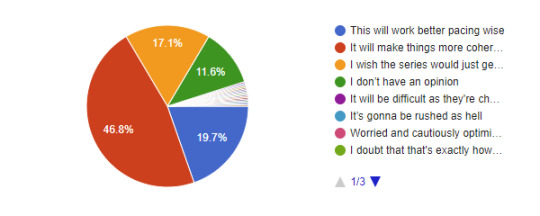
It would appear that the majority of those who took our poll express cautious optimism at the prospect of seeing all (or the vast majority) of Reiner’s backstory being adapted into a single episode, with a near 47% supporting the move, thinking it could make the narrative “more coherent”. Almost 20% argue it would work better pacing wise. On the flipside, just over 17% state that they would rather have a more accurate adaptation to the manga. 11.6% simply say they have no opinion. There were also more than a few write-ins.
I do wish everything could be animated to full detail, but pacing and structure will benefit here
They've done a good job so far, so I'll reserve judgement until I actually watch it.
It will be difficult as they're chapters with loads of dialogue, but they can pull it off if unnecessary stuff gets cut out or changed in some type of way (like watching Marcel's death for the sixth time, them breaking through the wall or even Jean and Eren fighting)
If they get the pacing right, then the rearrangement will be for the better.
Reiner flashbacks + Reiner suicide attempt + Falco meeting "Kruger" (more than 2,5 chapters) in a single episode? HELL NO! WTF MAPPA!
Worried and cautiously optimistic.
At least it looks like they're going to stick to just one episode for the RBA flashback. It was mostly just filler anyway, so there was never any need to stretch it out and waste precious time getting back to the Paradis side of the story
I doubt that that's exactly how it is, but if so, then I don't think that that's a wise idea
It’s gonna be rushed as hell
Reiner flashback is very long and there is tons of dialogue, so I dont know how its going fit in only one episode, but if they can make it work then its fine for me
WHICH CHARACTER DESIGN DID YOU LIKE BEST IN COMPARISON TO THE MANGA?
346 Responses
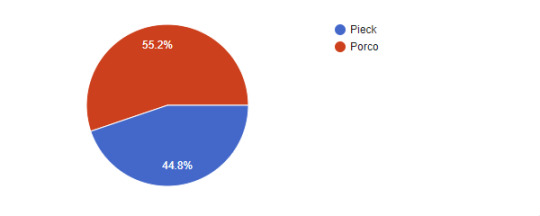
This question gave us a somewhat evenly split pie chart, but Porco nonetheless managed to gain the bigger piece with just over 55%. Surely due to that bomber jacket and haircut. Nearly 45% picked Pieck (gottem) instead. Must have been the somewhat inconsistent nose.
WHO’S SEIYUU DID YOU LIKE BEST?
335 Responses
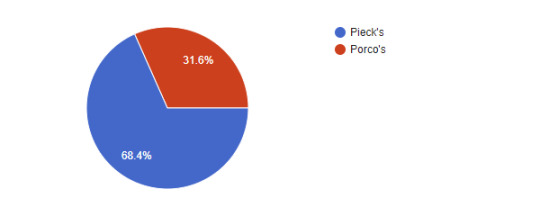
On the flip side, 68.4% seemed to prefer Pieck’s soft voice. Porco with his (how the hell does Porco sound like… how can you describe his voice) managed to win the hearts of 31.6% of responses.
Pieck voice wtf? I imagined Pieck with a more Hanji-ish voice, not this sweet and high pitched.
DID MAPPA DO PIECK’S NOSE JUSTICE?
345 Responses
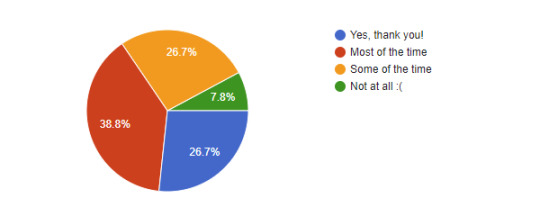
The debacle over Pieck’s POWERFUL nose gave us quite a colorful pie chart. Almost 39% of responses noted that Mappa was on point with Pieck’s nose for most of the episode. Afterwards, 26.7% stated that they thought that Mappa got it right only in some points of the episode. On the flip side, another 26.7% thought that Mappa was generally quite on point throughout the entire episode. A small minority (7.8%) thought that Mappa simply did a poor job.
The animation is good, and while I don't want to complain, I have a small problem with the drawings themselves. I feel like they lack precision (like Pieck's nose, idk if that's clear).
I'm grateful for Pieck's nose. I always respected Isayama for drawing imperfect characters, because this way he has made them to look more realistic. Even though Pieck has so-called imperfect nose, she is still absolutely gorgeous. Her imperfections are part of what makes her beautiful and unique.
PORCO’S HAIR - WERE YOU TEAM RED HAIR OR BLOND HAIR? AND ARE YOU HAPPY WITH HIS ANIME COLOR SCHEME?
345 Responses
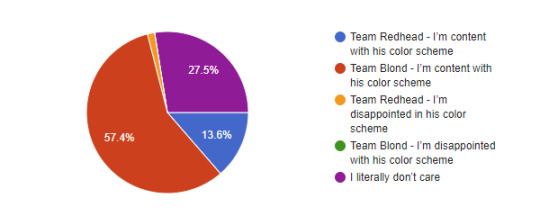
A far less controversial debacle concerned Porco’s hair scheme. The folks supporting a Blond color scheme were universally content with his hair color (all 57.4% of team Blond). On the flip side, an almost universal approval was also present from team Redhead (13.6% of those supported his blond hair color). 27.5% of the responses seemed to care not about this issue at all, however.
NOW THAT WE KNOW PORCO BETTER IN THE MANGA, DO YOU THINK HE WOULD HAVE *ACTUALLY* DONE A BETTER JOB THAN REINER IF HE HAD INHERITED THE ARMOR AND WENT TO PARADIS?
348 Responses
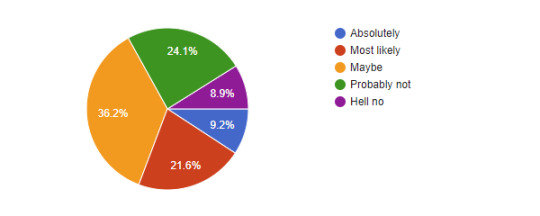
Porco inheriting the Armored Titan is a rather interesting what-if scenario. Perhaps of the most interesting as a whole, so it’s no surprise to see a rather divided opinion of those who took our poll. A little over 36% believe that Porco doing a better job than Reiner on Paradis is a definite possibility. Just over 24% believe it’s not likely Porco would have done better than Reiner. On the flip side, 21.6% think that is is likely Porco *would* have a more successful conduct on the island. 9.2% believe that Porco’s success is a given and in opposition to that, 8.9% think that Porco’s success would have been basically impossible.
HOW ABOUT IF PIECK HAD GONE TO PARADIS WITH THE WARRIORS?
346 Responses
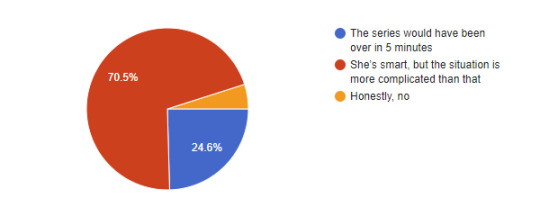
Much less division here, however. 70.5% of responders believe that Pieck’s possible trip to Paradis (in the initial attack) would have not have resulted in a given “mission success” for the Warriors, although she would have been a rather useful ally. Nearly a quarter, on the other hand, think that Pieck’s inclusion would have ended the story right then and there. The rather small minority of the other responders think that Pieck would not have been useful had she participated in the mission.
GABI HAS ALWAYS BEEN A CONTROVERSIAL CHARACTER. HAS MAPPA BRINGING HER TO LIFE CHANGED YOUR FEELINGS TOWARD HER?
342 Responses
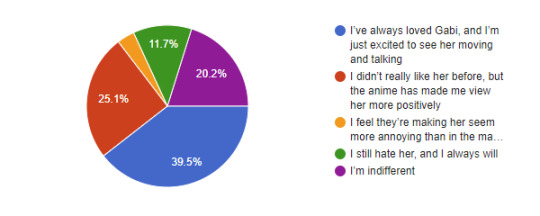
64.6% of respondents overall have positive feelings toward Gabi as of right now, with 39.5% having already been enjoying her character throughout the manga. 25.1% now view her more positively with her being brought to life. 20.2% don’t really care about Gabi either way, and 11.7% feel very negatively toward Gabi, without the anime swaying their opinions.
Gabi still sucks
Sakura ayane as gabi is probably the best thing to happen to me all year
WITH SUCH A DIALOGUE-HEAVY ARC, CUTS WERE INEVITABLE. WHICH CUTS WERE YOU DISAPPOINTED IN, AND WHICH CUTS CAN YOU LIVE WITH?
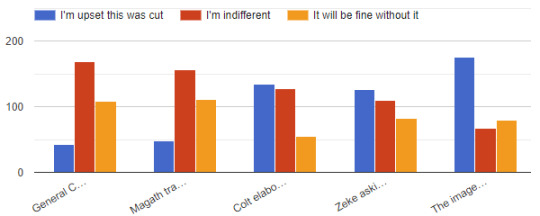
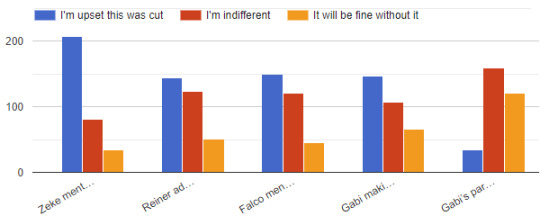
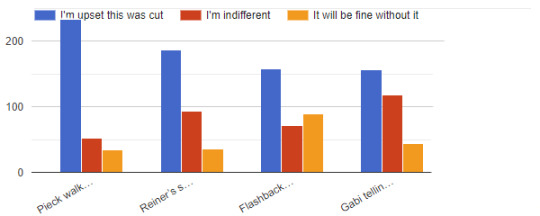
Overwhelmingly, the scenes that were most missed by manga readers were “Pieck walking on all fours/scaring Porco”, “Zeke mentioning the Ackerman Clan”, “Reiner’s smirk when his family talks about ‘Island Devils’”, and “The imagery of Eren and Armin wrecking ships”. Smaller character details, such as Reiner mentioning how he acted like Marcel on Paradis, Gabi wishing to understand Reiner’s feelings, Falco pointing out how Reiner almost had the Armor taken from him, were also very missed by manga readers, although just less so.
General Calvi talking about Zeke’s loyalty, Gabi getting praise from her parents when they reunite, and Magath trashing the Marleyan navy, were moments that many respondents didn’t feel strongly about one way or another, or felt that these were details that weren’t really needed anyway.
Cutting the scene where Falcon talks about why Reiner kept the AT was really bad. Also the table scene could have been better. Some imagery when Reiner was describing the 104th and his smirk.
The cuts the anime has done made the spectators less informed about some story background stuff. This is in order to direct attention to the marley's eldians planning how to overcome the world's disparagement towards the power of the titans.
I'm sad they cut the gate guards. They humanize the marleyans a bit. Hope they add their scenes next episode and do them justice.
I hope we will get the Gabi/Reiner talk about understanding each other through PATHS when she eats him next episode
Gimme crawling best giiiirl
MAPPA cut Pieck's ass so this episode wouldn't be so ass centered with Zeke's ass wiping technique. This is my theory lol
Great episode but U was so looking forward to the Reiner scene talking about Paradis “devils”. In the mange it was a powerful scene really adding to the duality of Reiner and the pain he has, and the animation did not do it justice. Plus some parts of his speech were probably hard to understand for a non mange reader without the flashback. (Like which one is referring to Jean for example). I really wish it had been better delivered
IS THERE ANY CHANCE WE’LL SEE SOME OF THESE CUTS ANIMATED IN A LATER EPISODE?
342 Responses
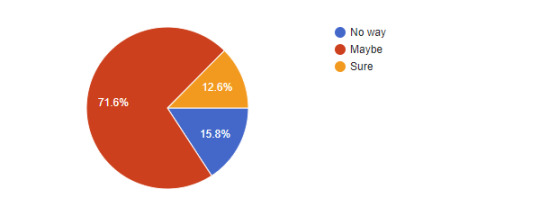
them into different scenes. Overall, the majority answered a big, fat, “maybe.” 15.8% are confident that what’s done has been done, and 12.6% are more optimistic that MAPPA will find a way.
Overall I was a bit disappointed. I feel like the amount of material cut from every conversation included really added up overall and gave it a very rushed feel to me. I really hope they add it all in later.
ON THE FLIP-SIDE, WHICH ADDITIONS/CHANGES DID YOU LIKE/DISLIKE?
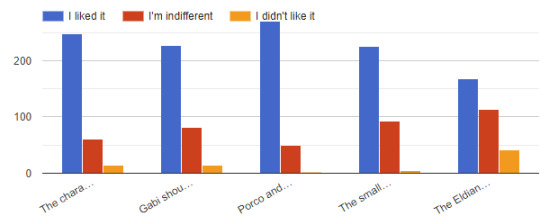
The changes and additions that MAPPA made were overall viewed very favorably, with the scene of Porco and Pieck interacting with the warrior cadets being the most liked addition. This is followed closely by the overall character movement during dialogue scenes, the small detail about Pieck’s father being unwell, and Gabi shouting “Watashi!” on the train.
I loved the additional details made it very emotional
IT WAS A GREAT TIME TO BE GALLIPIECK TRASH
Sneakier Eren's a nice addition too
Porco my boiii I'm so happy he's here 💖💖💖💖 if mappa is adding some extra scenes then gimme more of gallirei 👀
WHICH SCENE FROM THE PREVIEW ARE YOU MOST LOOKING FORWARD TO?
338 Responses
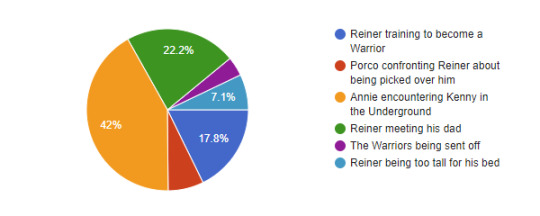
Unsurprisingly, 42% of respondents are hyped about Kenny’s brief return and Annie’s unlikely encounter with him in the Underground. 22.2% are eager to get that sweet Reiner angst as he is rejected by his Marleyan father. 17.8% are looking forward to Reiner’s training days.
ADDITIONAL THOUGHTS ON THE EPISODE?
great! it was inevitable they would cut stuff but it hasn't changed any major plot point or thing i would want to see desperately
It was just really great to see the scenes animated, it adds another level of depth and understanding to the story I believe.
Loved anime-onlies missing Eren completely. Some even thought it was him but then noticed the leg and thought against it
I think it was very well done. Just need a little getting used to with MAPPA on the reins now. I think MAPPA added some scenes to show how those Eldians over there are still just human after all and they have their own problems to deal with. 8/10 episode.
I feel like they took a lot of emotion way from reiner. made him seemed stoic and determined to go to the island even though in the make he looked scared about having to return.
I thought the rotoscoping was really well done! I’m happy with the pacing, the fact that the episode felt like it went by fast is good considering it was dialogue based.
Incredible. The direction, the cinematic quality, we are feasting. MAPPA is elevating the story beyond anything I could have imagined! I'm beyond hyped for the rest!! But where is asshole Marley guards/Hobo!Eren's appearance as a favorite moment?!
Incredible, it adapts the source material very well while adding some touches that make it unique in it's own way. As a manga reader, I'm really glad that they're doing this because it feels like a completly different experience from reading it and makes me excited on what changes or directing choices they're going to make during the course of the season, great job so far MAPPA!
Such an amazing episode. Made 20mins feel like 5. MAPPA is doing fantastic. The characters have never felt more alive and the animation style is something I never knew I wanted until now.
I can't believe they didn't cast Mads Mikkelsen to voice Mads Mikkelsen
The episode was good but the dinner scene didn't do justice to the manga. It didn't have the same feeling to it. I saw a lot of anime onlys thinking Reiner was just trying to talk shit about the 104th. I feel like the flashbacks during that part in the manga gave it a nostalgic feeling that helped convey what he truly felt about his time on the island. His facial expressions were not quite there either. Specially sad because it was the moment I was expecting the most this episode and because it's a big part of Reiner's character, maybe next episode can kind of fix this.
I haven't seen the anime only poll results, but given personal conversations with them I imagine quite a few could care less about the Warriors and are looking forward to the 104th showing up to stir shit up. Boy are those folks in for a treat :)
I knew I'd feel more attached to all of them once they got animated. I didn't expect getting real thirsty for Lainah.
I was so happy with how much detail MAPPA put into the background scenery. Also, I think that an underrated moment during this episode was the Marlian douchebag triggering the Eldian soldier’s PTSD. You could really feel their terror, and THEY KEPT THE HOBO EREN PART IM SO HAPPY!
Its consistently very pretty and well animated which is great of course, but I worry the team won’t be able to maintain this quality for some of the meatier scenes in the later episodes.
The fast pace of the episode (compared to the manga) as well as the many cuts make it a bit harder for scenes to stick, I wish there was a bit more breathing room at times. This also makes the fancy animation and frequent rotoscoping cuts feel less impactful for me—with every scene being cut down to its core ingredients, and every scene having at least one cut with more motion and energy than we’re used to, I can’t help but feel it all kind of mashes together without sticking out as much, leaving less of an impact. (I feel really really weird actually complaining about good camerawork/animation, what the hell lol)
Also hobo <3
Plenty of questions about ass but no questions about the full ED? Or how we thought the episode did at hiding Eren in plain sight?
rip Reiner's chocolate abs :'(
The episode wasn't as interesting as the first one. I was yawning from time to time. Yet, I think that Mappa did a great job, because it's hard to animate full of dialogues chapters. I was disappointed of the fact that flashbacks from Paradis have been cut. I hoped to see Sasha, Connie, Ymir and Marco while Reiner was speaking about them. Without the flashbacks we just got the dry speech and this way hard to say what Reiner is really thinking about people he met on Paradis. We - as manga readers - already are aware of his feelings, but anime onlies may not know and see Reiner as cold hearted person.
I'm not complaining over animations or the OST tracks because no studio is perfect and some small mistakes here and there won't destroy my fun. I just sit and enjoy the episode.
Very good, with the exception of the dinner scene, in which the director missed the mark completely with the tone.
WHERE DO YOU PRIMARILY DISCUSS THE SERIES?
328 Responses
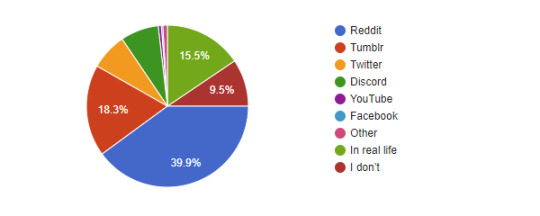
Thank you again for participating! We’ll see you again next week!
22 notes
·
View notes
Link
via Politics – FiveThirtyEight
Welcome to FiveThirtyEight’s politics chat. The transcript below has been lightly edited.
sarah (Sarah Frostenson, politics editor): Georgia’s new voting law has captured headlines for all the ways in which it makes voting harder. It’s also not the only state considering these kinds of laws; there are nearly 20 states in which voting restrictions have already passed at least one step of the legislative process. More than 300 voting restriction bills, according to an analysis by FiveThirtyEight, have been introduced in state legislatures this year following months of fraudulent claims from former President Trump and his supporters that the 2020 presidential election was rigged. (Sixty percent of Republican voters still say the election “was stolen” from Trump.)
But understanding the effects of laws like Georgia’s is complicated. There’s not really solid evidence one way or the other that this law will hurt Democrats or help Republicans. It’s also a point that elides a more fundamental one: If one party increasingly supports anti-democratic measures, does anything else outweigh that?
Public opinion on voting laws isn’t clear-cut either — provisions like a ban on giving voters food and water (something the Georgia law did) are unpopular, but voter ID laws are broadly popular. So let’s address the politics, public opinion and research on voting laws to better understand the contours of this debate, tackling this chat in two parts:
First, how much does it matter that Republicans’ election security push is precipitated on a lie? That is, as there has been no evidence the 2020 election actually experienced wide-scale fraud, does that undermine Republicans’ argument?
And second, how much do Americans care about voting rights as an issue?
OK, first up — The argument from Republicans supporting these new laws. What do they want in the push for more “election security”? And how much does it matter, at this point, that there wasn’t actually wide-scale voter fraud in 2020?
nrakich (Nathaniel Rakich, elections analyst): IMO, the “Big Lie” is the key to understanding Republicans’ motivations. Everyone can agree that elections should be secure. But …

… the specific methods of voting being targeted by Republicans (almost half of the voting restrictions that have been introduced regulate absentee voting), the states in which they are targeting them (disproportionately swing states), and the timing of that targeting (after Republicans lost the 2020 election) all suggest that they are only passing these restrictions because they think they will help the GOP win future elections.
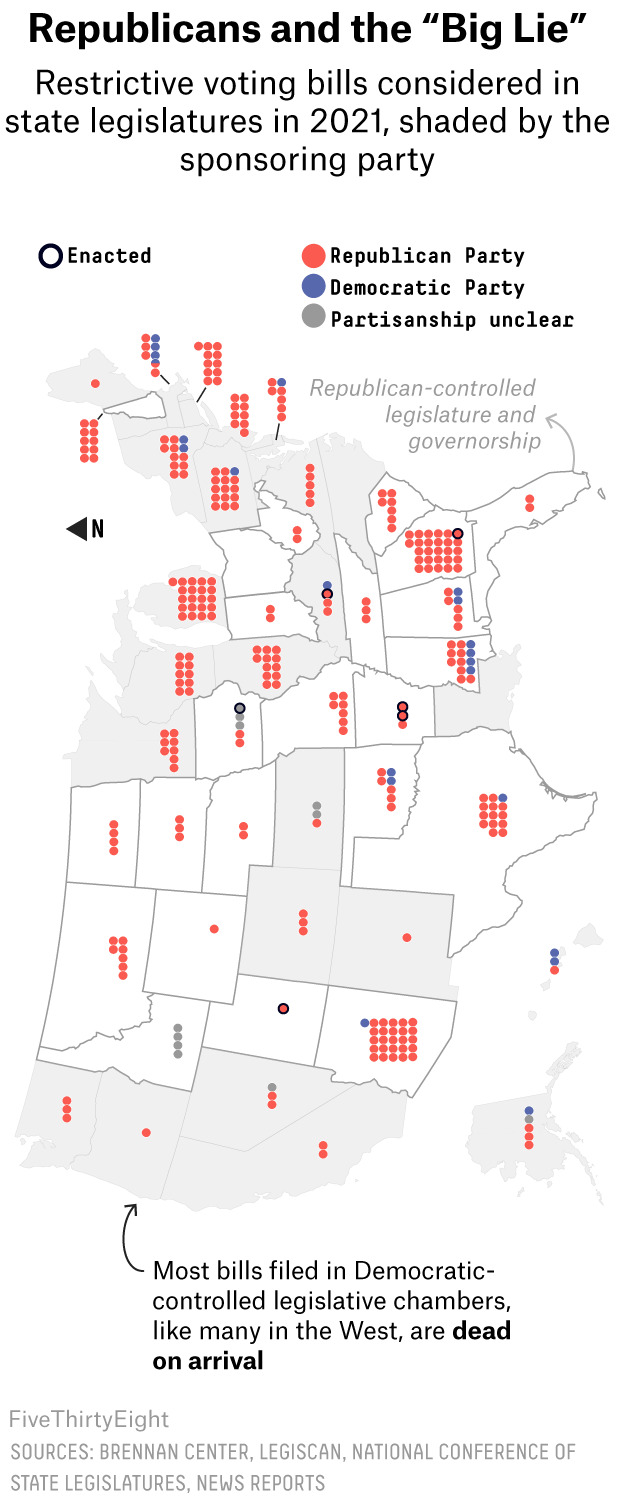
alex (Alex Samuels, politics reporter): But to your second question, Sarah, this is the narrative conservative lawmakers and many of their voters have bought into, right? That the 2020 election was supposedly stolen from Trump?
There was never — and still is no — evidence of massive voter fraud that Trump and his allies stated as fact. But because it was repeated so many times and with such certainty, large parts of the GOP electorate came to believe it.
As long as the “Big Lie” continues to be pervasive, we’re going to keep seeing these efforts to get these restrictions passed, as Nathaniel notes.
nrakich: Alex, it’s an interesting question whether these Republican legislators actually believe that rampant voter fraud cost Trump the election or they are just going along with it because it’s politically convenient. But I’m also not sure it matters. Either way, they are making policy based on a conspiracy theory.
sarah: Right, setting aside the question as to what extent Republican politicians buy the “Big Lie,” it is pervasive among Republican voters: In a March 30-31 Reuters poll, 6 in 10 Republicans said they still believed the election “was stolen” from Trump “due to widespread voter fraud.”
nrakich: And rank-and-file Republicans are correspondingly willing to make voting harder in order to get their desired outcome. According to the Pew Research Center, only 28 percent of Republicans now say “everything possible should be done to make it easy for every citizen to vote,” down from 48 percent in 2018.
alex: Republican politicians also seem to acknowledge that it’s likely they won’t win future elections without some sort of changes to the voting system. Sen. Lindsey Graham told Fox News that “mail-in balloting is a nightmare for us,” even though it wasn’t controversial before this past year. I think these changes are more about preserving power than about “voter fraud.”
And to Nathaniel’s earlier point, few Republicans lawmakers are doing anything to stop these bills from passing. Even the ones who don’t necessarily think there was fraud.
julia_azari (Julia Azari, political science professor at Marquette University and FiveThirtyEight contributor): The argument about election security boils down to an argument that people voted who shouldn’t have, right? That there were questionable votes.
And so reforms based on the “Big Lie” hinge on the 2020 election having those kinds of irregularities. People might not come out and say it was because people of the wrong skin color voted — they might say, well, people should have been ineligible because of changes to early voting rules or whatever. But in the context of both the history of disenfranchisement of African Americans and more recent fears about people living in the country illegally voting, the implication is pretty clear. When the solution is to tighten up the voting rules, you have implied that the problem is the wrong people voting.
nrakich: Yeah, Julia, you see this in how surgically targeted some of these provisions are. For example, legislators in Georgia originally proposed banning early voting on Sundays, which would end the “Souls to the Polls” initiatives that are so popular at Black churches. That provision did not end up passing, but one that did — prohibiting food and water be handed to voters in line — will disproportionately affect urban areas, where there are both more lines and more voters of color.
alex: Myrna Pérez from the Brennan Center told us something similar, Julia. The bills we’re seeing now reflect “a real fear over the browning of America, and folks trying to protect what they have and keep the power for themselves.”
sarah: And as you all are saying, sometimes it’s hard to see that this is what these restrictions intend to do, because some of the more draconian measures don’t end up passing and the exact language of the measures that do pass isn’t quite so explicit (i.e., “This voting measure intends to disenfranchise Black Americans.”).
The New York Times’s Jamelle Bouie argued this in his essay on how it’s not an exaggeration to compare the current voting restriction push to the Jim Crow era. That is, a lot of the ramifications and larger purposes behind these bills weren’t immediately clear until all the pieces fell into line. “[T]he thing about Jim Crow is that it wasn’t ‘Jim Crow’ until, one day, it was,” writes Bouie.
At this point, though, do Republicans need the “Big Lie” to push through this agenda?
That is, it feels like there is a shift at play here with Republicans increasingly distancing themselves from the election being stolen in 2020 and more so focusing on scoring points against how Democrats are now characterizing the laws (i.e., Jim Crow 2.0).
In fact, we’ve already seen some of this reframing in how Republican politicians criticized Major League Baseball’s decision to pull its All-Star Game out of Georgia over the new voting law, with Senate Minority Leader Mitch McConnell warning CEOs to “stay out of politics.”
What’s Republicans’ long-term strategy?
nrakich: Many of the new arguments that Republicans are pushing are in bad faith, though. For example, Georgia Gov. Brian Kemp has claimed that Georgia’s new law actually expands voting rights because it allows for more early voting. But that completely ignores the many more objective restrictions in the law, such as less time to request an absentee ballot and the need for absentee voters to provide voter ID — not to mention arguably the most concerning part of the law, the part that gives the state elections board the ability to remove local election officials.
alex: I agree. Republicans’ motivation, long term, seems to be anti-democratic. Even Trump dismissed proposals to make voting easier last year. So now the post-Trump strategy seems to be focused on how best to win elections, and even though Republicans have maybe not explicitly said they don’t think they can do that without overhauling the current system(s) in place, that seems to be what’s happening.
nrakich: McConnell’s request for corporations to “stay out of politics” is also pretty funny — he sounds like Bernie Sanders! What McConnell means, of course, is that he wants corporations to stop disagreeing with him politically. (Corporations have been intimately involved in politics for hundreds of years.)
sarah: It is a difficult position for a party that is traditionally pro-business to adopt this stance, too.
nrakich: Exactly, Sarah; it’s disingenuous. Republicans have historically wanted corporations to be more involved in politics — e.g., when they’ve defended corporations’ right to give money to political campaigns.
julia_azari: I mean, part of the founding ethos of the Republican Party was about creating a strong national economy based on free (as opposed to slave) labor. Nineteenth-century Republicans saw the purpose of government as being able to help American business grow strong.
So I read McConnell’s statement as “stay out of politics that challenge existing power arrangements.”
alex: Isn’t Republicans’ argument with MLB, though, that it’s overstating what Georgia’s law does?
nrakich: What do you mean, Alex?
alex: Maybe my Texas bias is showing, but Gov. Greg Abbott said yesterday that he wouldn’t throw out the first pitch at the Texas Rangers’ home opener after MLB adopted “what has turned out to be a false narrative about Georgia’s election law reforms.” (That’s straight from his statement.)
sarah: Right, Republicans are now attacking Democrats for overplaying their hand in how they’re describing what the laws actually do. But Nathaniel hit on this earlier — while there might technically be a longer early voting period in Georgia now, there is less time to request an absentee ballot and it’s harder to cast an absentee ballot because a voter must provide voter ID.
julia_azari: The inconsistency of the arguments the GOP has been using to defend their position is wild.
nrakich: Yes, Julia, it’s so bizarre! If you truly believe that “voting shouldn’t be easy” is a defensible position, you should make that argument (e.g., on security grounds).
But instead many Republicans are insisting that they are the party expanding voting rights, which suggests that they agree with the premise that restricting voting is the wrong side of the debate to be on.
julia_azari: I think this reveals a key asymmetry (or at least a potential one). Democrats can overplay their hand by stoking outrage in their supporters and end up being lambasted for being wrong or exaggerating. Republicans, on the other hand, don’t seem to suffer repercussions for changing up the logic of their arguments; instead, they seem to have found a strategy in attacking “cancel culture” whenever under scrutiny.
sarah: What’s also so hard to disentangle in laws like Georgia’s is there are really two things happening at once. First, there are actual changes to the voting process, but then there are also changes that affect how elections are administered, and in the case of Georgia, make it easier for politicians to interfere.
Nathaniel mentioned it earlier, but take the part of Georgia’s law that now allows the Republican-appointed state elections board to remove local election officials and essentially remove the secretary of state’s role in ensuring the election was conducted fairly.
We know that in the 2020 presidential election, Georgia Secretary of State Brad Raffensperger refused to kowtow to Trump’s demand that he find “11,780 votes,” but now that guardrail is gone.
A lot of what we’re talking about here is moot, though, if Democrats are able to push through their sweeping voting reform bill, H.R.1.
julia_azari: I’m on team “nothing else matters” once we’ve passed a certain anti-democratic threshold. And the provisions on election administration in Georgia’s law are worthy of a lot of attention — even if it’s not clear what they’ll mean in practice.
The period between the 2020 election and the inauguration featured a lot of attempts to mess with the Electoral College votes. There was real drama over certification in Michigan, for instance. You’re seeing a move — even if it’s slight — toward the direction that people shouldn’t actually get to choose their slate of electors or that state legislatures can have a stronger hand in that process. This is like early 19th century stuff.
sarah: Is voting rights something Americans care about, though?
alex: Considering this is something some people fought for the right to do for decades, I’d say yes. Others might have a different answer, though, because not everyone votes.
nrakich: Historically, voting rights hasn’t been an issue that has motivated many voters; it barely cracks the list of the most important problems facing the country, per Gallup polling. It’s hard to get people worked up about wonky provisions like whether people should be able to register to vote on Election Day or sometime before, or whether there should be one week of early voting versus two.
But I think framing these wonky issues as questions of rights and the health of our democracy has the potential to be very motivating. Especially if some voters (i.e., people of color) feel that their rights are being abridged.
alex: And I think that’s what Democrats have been doing so far: framing what’s happening in Georgia and other states as a “Jim Crow 2.0.”
That’s also probably easier to understand — and more motivating — than explaining the nitty-gritty measures in each individual bill.
nrakich: Look at what happened in North Dakota in 2018. The state passed a law that required voter IDs with residential addresses on them — something many Native Americans who live on reservations didn’t have. But the law appears to have backfired; Native Americans were highly motivated to exercise their right to vote in spite of the law, and Native American turnout skyrocketed.
julia_azari: Yeah, this is a pretty well-documented phenomenon. I want to make sure we clarify, though, that we are using this as an illustration of how important voting rights are to people, and not in the sense of “these laws are OK because there’s always countermobilization!” The latter caused so much angst on Twitter over the weekend in response to The New York Times’s Nate Cohn’s analysis of Georgia’s law.
alex: I’m torn on the countermobilization argument, because I’ve seen the same logic used to talk about Black voters (i.e., efforts to make it harder to vote will motivate more people and backfire against Republicans). But people shouldn’t have to surmount unconstitutional hurdles to vote!
I’m not saying you’re making that argument, Nathaniel, I’m just saying I’ve seen a few people argue that voter suppression isn’t real because a turnout gap didn’t/doesn’t materialize as expected.
nrakich: Agreed 100 percent, with both you and Julia. Even if a law doesn’t deter a single person from voting, it might still be restrictive if it imposes additional hardships on existing voters.
For example, even if people are willing to wait hours in line to make sure their vote gets cast, that inconvenience can have non-voting-related consequences, such as having to pay extra for child care or losing out on wages at your hourly job.
sarah: For sure, the most important thing is that people have the right to vote without it being a burden. But I also want to return to this question of electoral impact, because the research is really mixed on it.
Some studies have suggested that absentee voting didn’t help Democrats’ margin in 2020, or as Cohn’s analysis of Georgia’s law suggests — it’s really hard to know whether this will impact turnout negatively in elections moving forward. But something we found in the research for our 2020 forecast was that if we account for changes in how easy it is to vote in each state based on a cost of voting index researchers have put together, states with higher barriers to voting tend to produce better results for Republican candidates while states with fewer barriers tend to lean more toward Democrats.
nrakich: I think a lot of nuance is called for when attempting to answer this question of electoral impacts. Discussions like these often lump different types of voting restrictions (or expansions) together, but not every voting reform is created equal.
For instance, I am persuaded by the studies that show that changes to absentee voting laws are unlikely to change the outcome of an election. But political scientists have found that things like banning/instituting same-day voter registration actually can have significant effects! This thread from political scientist Charlotte Hill was very instructive in that regard:
The idea that making voting easier *won't* improve turnout is one of political science's worst takes. (And to be clear, many political scientists don't buy it.)
In this thread, I'll explain why. Buckle up. https://t.co/NH1HH0YYuZ
— Charlotte Hill (@hill_charlotte) April 3, 2021
sarah: It also seems as if making voting easier is becoming an increasingly polarized issue, with far more Republicans now unwilling to say that “everything possible” should be done to make voting easier.
julia_azari: Yeah, on the question of polarization, this debate isn’t necessarily always going to be directly related to which laws help which parties, but rather how voters understand those laws in relation to their own partisan motivations — what they dislike about the other party, how their own identity motivates their partisanship.
This thread from political psychologist Christopher Federico linking support for restrictions to racial attitudes is also useful.
Been digging into the new 2020 ANES release this week, and I got curious as to what might predict negative attitudes toward increasing ballot access. So, I took a look at the ANES items on early voting, voter ID, and felon disenfranchisement. (1/n)
— Christopher Federico (@ChrisPolPsych) April 2, 2021
sarah: Where do you all think the fight over voting rights heads next?
alex: Whether Democrats can actually agree on something and get H.R. 1 passed is a big open question. But there’s also how many of these restrictive bills actually pass and where that leaves Republicans two years down the line.
If Republicans only pass a few dozen of these bills, do they continue pushing for them in future legislative sessions? (I would bet the answer is yes, but I’m curious to see how this progresses over time.)
julia_azari: A couple of questions I have been thinking about: One is the degree to which Trumpism within the Republican Party is about winning elections without winning majorities of the multiethnic electorate, and another is where standard political hardball ends and being anti-democratic begins.
And at the risk of sounding stupid because I know these things are so intertwined at this point, I also wonder how to think about what’s about partisanship versus what’s about race. A really cynical take would suggest that elite Republicans are taking advantage of the salience of these demographic issues in order to produce institutional changes to consolidate power.
nrakich: I just think voting rights is an extremely nuanced issue that requires people to acknowledge a ton of realities all at once.
Some voting restrictions probably don’t affect turnout or who wins.
But others might.
But backlash/countereffects can scramble that calculus too.
But electoral impacts are only one small part of why these laws matter.
They matter in how they affect the convenience of voting too.
Regardless of impact, intent is important (e.g., it matters that Republicans are pushing voting restrictions shortly after losing a major election and crying “voter fraud” about it).
It matters normatively that it has become the position of one of the two main political parties that it should be harder to vote.
Regardless of impact, context is important (e.g., this is not the first time that a state like Georgia has tried to make it hard for certain people to vote).
It’s important to acknowledge the racial impacts/motivations of these laws.
“Voting restrictions” (or “voting expansions”) is an extremely broad term that encompasses a ton of more specific proposals, which should probably be judged on their own merits because they each have different impacts and are just or unjust to varying degrees.
4 notes
·
View notes
Text

It is November 8th, 1994.
Two short years ago, Ross Perot was snubbed of a chance to be the President of the United States by a “corrupt bargain”, designed to uphold a duopoly of power.
Two short years ago, Ross Perot started a political party to tear down the system which denied him a chance at representing America.
And two years later, the Reform Party and Ross Perot are the most powerful force in American politics.

-- March 1, 1993 --
The aftermath of the presidential election of 1992 still fresh in his mind, Ross Perot begins 1993 with a resolve to change the United States political system as everybody knows it.
Perot first considers immediately announcing his candidacy for the 1996 presidential election–even though 1996 is still four years away–but ultimately decides against it as too ineffectual. Four years is a long time in politics, and Perot sees a need for urgency, not measure. More importantly, though, Perot wants a movement, not just a moment.
One day in March, in New Jersey, Ross Perot meets a man named Frank Conrad. Conrad was an ardent Perot voter in 1992, heartened by his promises of change and his populist attitudes–the two exchanged pleasantries before local news cameras and talked about the pressing issues of the day: Clinton’s controversial victory, what the new administration might do, and the future of NAFTA, then working its way through government and something which Perot had strongly opposed on the campaign trail.
But toward the end of their meeting Conrad also suggests something to Perot offhand–a new political party. “There is no two-party system;” said Conrad on that fateful day, “it just looks that way. We all want some kind of new party.”
The remark makes a little wave in the local press, getting slapped deep in the pages of a local newspaper with other amusements and oddities–but it has a big impact on Ross Perot.
One day later, Ross Perot calls together the political groups which had supported him in 1992 and immediately begins organizing his political party: he calls it the Reform Party of the United States of America, or Reform Party USA.

-- June 1, 1993 --
“We come to serve the people, not the powerful!” were the words that Ross Perot used to kick off his June 1st announcement in Dallas–rumor had been building for weeks that he was up to something, and the movement of the groups which in 1992 had nearly lofted him to the presidency raised eyebrows on its own, although his confidantes were tight-lipped about it all. Even as press passes were issued and reporters filed in, the purpose of Perot’s conference remained uncertain; but the grandiose pageantry of Perot’s podium flanked by dozens of American flags made it abundantly clear that spectacle was certain–and if there was anything Perot excelled at, it was spectacle.
Perot’s speech decried the two-party system and the failure of the Clinton administration to make amends with the majority which had dissented from President Clinton’s election. He declared the political system corrupt and its machinations undemocratic, and that only wholesale reform could provide everyday Americans with a say in the system. Perot rejected the Electoral College as diluting the vote of every man and woman; he rebuked the Senate’s design as archaic and in need of drastic change; and he called for campaign finance reform, to level the playing field.
But Perot said too that he did not expect such changes from the “two-party duopoly” which had “denied him a fair shake.”
“Therefore,” Perot continued, “the change must come from America itself–and a new party must form to facilitate this change, the Reform Party!” It was obvious now what Perot was setting out to do.
Perot launched into the meat of his speech: “We come here to declare that we are building a party of the people, by the people, and for the people!” The party was to represent Americans–to build for them an America they could say they had a hand in. As he had done with the beginning of his presidential campaign just a year earlier, Perot called on the “ordinary American” to draft the Reform Party onto the ballot and to run on the Reform ticket. He concluded with hope for change, and a dream of a more equal America for all.
And within a week of Perot’s speech inaugurating them, the Reform Party of the United States was a major player in American politics.

-- January 1, 1994 --
Over three-thousand candidates.
That was how many candidates the Reform Party had recruited or seen sign up in just seven months, from Senate seats to House seats; from governorships to mayorships; from state house races to state attorneys, and everything in between. The Reform Party, by far the newest kid on the political block, had started lofty and stayed that way–and voters certainly seemed receptive to these unorthodox politicians in the same way they were receptive to Perot just two years earlier.
It had simultaneously come as expected–and a surprise–to the punditry.
Opposition to President Clinton had certainly been expected. For one, the incumbent was bogged down in political scandals litigated by an increasingly bloodthirsty Republican minority and incompetently managed by the Democratic majority. For another, the then-developing Clinton healthcare plan was uniting the right in opposition, and an incompetent rollout left many Americans (and even many liberals) skeptical at best and ardently opposed at worst.
More pressingly, though, President Clinton was nursing a wounded economy which–although recovering–was still felt by the average American. Altogether, the consequence was hurt in the polls: an abysmal 37% approval for the President, and a high likelihood of what was currently a 40-seat majority in the House and 7-seat majority in the Senate evaporating in November.

And it was no surprise, then, to forecast Republican benefit from Clinton’s mishaps. The Republican Party looked almost destined to deal a huge blow to the Clinton administration–one which Perot had ensured they could cast a shroud of illegitimacy on, although George H. W. Bush had performed exceptionally poorly. Newt Gingrich, essentially the face of Republican leadership by this point and likely Speaker of the House if they won, was still months from formulating the Contract for America but seemed to be itching to add another blow to an already reeling presidency.
But nobody had anticipated the maverick Ross Perot forming his own party–it was widely assumed he would bide his time for another presidential run. And even if they had, it was unimaginable that such a party would garner such a wide base as Perot had in his 1992 run.
But even at this early stage, something strange was happening: Reform candidates were winning in private polling. First these were isolated occasions or outliers, and they could be “comfortably” discarded as outliers or bizarre artifacts of early polling.
Then, they began to multiply.
-- June 1, 1994 --
By June, only a single conclusion could be expressed by all: 1994 was a three-party race.
All throughout the winter and spring, both parties believed the Reform tide they were seeing behind the scenes would ebb–but it never did. It strengthened, actually, and soon both Democrats and Republicans were scrambling to get their campaigns in order. Ross Perot had promised a better world, and Americans were seemingly prepared to take a gamble.
In some cases, the Reform Party scored veritable coups in recruiting candidates and that seemed to contribute to their successes: Angus King in Maine, for example, had been set to run as an independent in Maine’s gubernatorial race–but when approached by Perot gladly took the Reform Party line. But more often it seemed people simply wanted a change of scenery, as it was when ordinary-girl Dina Salberg suddenly seemed within striking distance of Tim Johnson, a Democratic whip in the House.
Inexperienced or seasoned, Democrats and Republicans alike soon found members of their caucus battling back not only against the other party but against a tide of seemingly-insatiable Reform Party supporters.
Democrats stay quiet and keep their heads down, but Republicans are actively confrontational: on May 30, 1994, Newt Gingrich tries to force a discussion of the issues to the forefront by releasing the still-in-development Contract for America.
Initially, Gingrich seems to catch the Reform Party completely off-guard, and questions of what the Reform Party stands for abound in the press. For all the support it has, few of its candidates have yet been seriously pressed on what they would support. But within days, a response comes from the very top of the party: Perot releases a “People’s Contract” of his own, establishing that a vote for the Reform Party is a vote for term limits, a balanced budget, and significant structural reform among other things. Nearly every Reform candidate to whom it is relevant signs on–and ultimately when Perot threatens to make one of the talk show blitzes that so defined his early 1992 campaign Gingrich backs off, recognizing the dangerous charisma Perot has.
Going into June–and now having been seriously tested on the issues for the first time–the Reform Party’s support barely flinches.

-- November 5, 1994 --
In the Democratic Party, meanwhile, it is clear by August that the Democratic majority is all-but-lost, and the Reform Party especially looks like a devastating blow to it.
President Bill Clinton hits the trail–months earlier than he had anticipated–to try and salvage what he can of a seemingly untenable situation for the Democratic Party. Unpopular as he may be (and unpopular he remains as he does this), the party is facing a crisis both from Reform candidates and Republican ones. Things look especially grim in the South, where Republicans look poised to sweep into power; but more concerningly for the party, Reform candidates increasingly seems to hold the balance of power in both the House and the Senate. Clinton tries to shore up the Democratic South, and especially tries to keep Texas in the Democratic column.
Ross Perot also knows by August 1 how perilous the Democratic majority is, and recognizing his unlikeliness to box out major Republican gains focuses his attention on Democratic seats, particularly in Texas and the Pacific Northwest. In mid-August he begins a series of whistle-stop tours: first through the PNW and the Mountain West, then later through the heart of Texas, stopping to promote every major candidate he can. In one week he makes nearly twenty campaign stops, every one of them with a new Reform candidate.
In September, polling only confirms what seems so inevitable for Democrats: Reform candidates pull ahead in Nebraska’s Senate seat and gubernatorial races in Idaho, Nevada, and Texas; Republicans meanwhile are poised to flip both Tennessee Senate seats and look almost certain to carry Oklahoma’s Senate seat too. Some see it as inevitable realignment–some see it as the work of the Gingrich Contract with America, which is disproportionately favored by conservative whites who dominate the South. Regardless of cause, the outcome is the same nonetheless.

Gingrich for his part doesn’t feel especially comfortable either when, late in September, Perot suddenly turns his guns against the Republican minority’s efforts to hold the Democratic majority in check. Perot demurs Gingrich’s congressional hardball as “play acting” and suggests it to be “a lie engineered to make the Republican Party look like they care about corruption.” When reporters push Gingrich to comment on Perot, Gingrich ignores it and stumps, committing to his earlier stance of depriving Perot media blitz material–but Perot presses the matter when he can continually and it seems to eventually register with at least some on-the-fence voters.
Gingrich begrudgingly engages with Perot thereafter, knowing that he needs to keep the Republican vote consolidated behind him. He calls Perot a “demagogue” and suggests his folksy-populism to be entirely at odds with his incredible wealth–a criticism from Gingrich that would have been an unimaginable irony two years before. “We have kept the radical liberal left in check,” Gingrich would say, “and yet if you took it from this guy you’d think that was the problem!”
But ultimately the exchange seems fruitless for both parties–a tactical win for Perot, in one sense, since it wastes Republican time and energy.
In October, the late party pushes come. Clinton, having stumped all around the country, seems desperate to avoid a beating in the South in particular, the region which had allowed him to narrowly clear 270 electoral votes just two years earlier. Here, Democrats are at least willing to embrace the native son, but just as many of them also seem hopelessly behind in their races and effectively dead on arrival. Elsewhere, his distance is welcomed–many Democratic candidates think his presence is a harm to them.
Republican leadership in the meantime likes their chances in the South, but is cynical elsewhere. Perot, ever the optimist, has no projections but positive ones. He takes a final Midwest tour in mid-October, beginning in North Dakota and ending in his home state of Texas, and promotes dozens of his candidates along the way. Then November comes, and the final few days are essentially academic.

-- November 8, 1994 --
In contemporary American politics, there is no analogue for the election about to take place. Not since the Populist Party of the late 1800s has a third-party been in such a strong position as the Reform Party seemed to be. Not since 1955 has the Democratic Party been in a position to be ousted from power in the House of Representatives. Not since Reconstruction have Republicans been in a position to run the South. All of these things seem not only possible, but entirely likely in 1994.
The going is slow at first for the Reform Party’s possibilities–their strong states almost all close late, and the South (Perot’s weakest link in 1992 and where they hardly recruited) closes early. For Republicans, however, their big test comes early.
Indiana and Kentucky are the first states to close–at 6pm–and they quickly suggest a wipeout for Democrats. Three Democrats start down in Indiana and stay down–another in Kentucky follows. Georgia is a bloodbath at 7pm, with three more Democrats getting destroyed–Florida sees another–South Carolina sees another. By 7:30pm, when North Carolina sees no less than four Democrats tossed out ignominiously, it’s obvious the rout is on and nothing can be done.
But, in the north, New Hampshire closes: and it suggests something much more ominous for both major parties. Both House races–one held by a Republican, the other by a Democrat–are quickly called for the Reform candidates. New Hampshire had been a state Perot won by just 43 votes, yet the Reform Party had sniped two incumbents.
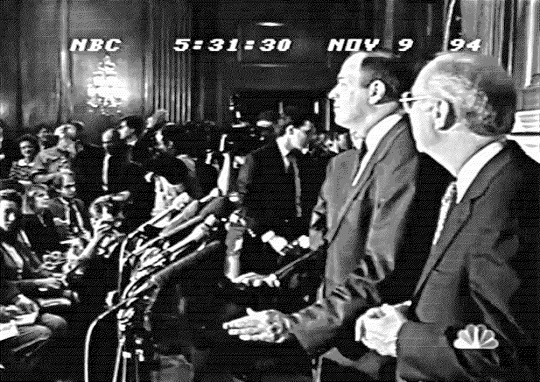
And at the 8pm hour, it became clear that the Reform Party had made deep cuts. Both Maine seats went purple, along with the governorship and the Senate seat–then a Connecticut seat–then Illinois and Kansas Reform candidates lit up the map. Oklahoma Reform candidates sniped two would-be Republican pickups–Michigan and Missouri candidates also picked off single seats. North Dakota fell to the wave easily, with a Reform candidate ousting single-term Democrat Earl Pomeroy. But the wave came particularly hard in Texas: eight Democrats fell in quick succession to Reform candidates, and two more to Republicans.
Republicans, meanwhile, continued dismantling the Democratic South: two Democrats in Tennessee–and both Senate seats–were easily pried away. Oklahoma’s Senate seat, long since written off, also fell quickly. Governorships fell in Tennessee and Alabama, then later in Oklahoma too.
Just as quickly, however, the feast of Southern seats dried up. Individual seats continued to fall to Republicans throughout the night in states like Florida and Mississippi, but the bulk were in by 9pm–and Republicans began to get nervous as it became clear that the Reform Party wave was still coming.

Arizona provided some initial solace for Republicans: a Senate seat flip and a House seat suggested Western gains were still to be had. But the Midwest soon made it clear that Arizona was an anomaly. Three Reform candidates flipped House seats in Minnesota–then Dean Barkley flipped the Minnesota Senate seat from Republicans–and a Republican gain in Nebraska was met with a Reform gain and the Reform Party ousting Senate Democrat Bob Kerrey. Wisconsin broke hard for the Reform Party, giving them four seats–then in the 10pm hour, a deluge.
Montana went purple–then South Dakota–then Nevada–then Iowa. In Idaho the Reform Party picked up a governorship, then they did the same in Iowa and Nevada. In Texas, a tight race broke for them, taking out governor Ann Richards and denying a gubernatorial flip to George W. Bush. Unbelievably, by the 10pm hour it seemed entirely possible that the Reform Party would hold the balance of power in the House–and, very possibly, the Senate.
So when Senators Slade Gorton and Craig Thomas suddenly fell to Reform-wave candidates in Washington and Wyoming, all but ensuring Senate control rested with the Reform Party, it was stunning. Equally stunning, however, was the tidal wave that befell the West Coast: 14 Reform candidates elected in California, Oregon, and Washington alone. Tom Foley, the incumbent speaker, is ousted; so are Sunny Bono and Jay Inslee, among other notable names. As the remaining seats trickle in, it becomes clear:
The Reform Party has not only won a major victory, it in fact holds the balance of power in the House of Representatives and the Senate. It has broken fifty-years of effective one-party rule. It has stymied Newt Gingrich and the Republican Revolution.
It is the most powerful party in contemporary American political history, and Ross Perot is its powerbroker.
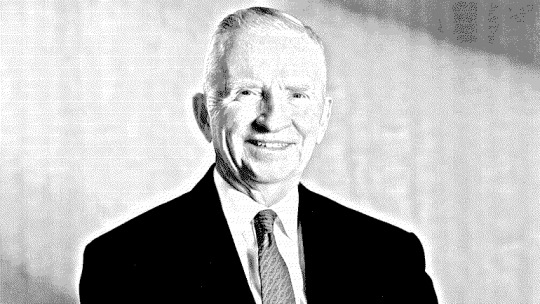
-- November 10, 1994 --
The following results can be officially confirmed:
HOUSE OF REPRESENTATIVES
Democratic Party: 191 seats (LOSS of 67)
Republican Party: 184 seats (GAIN of 8)
Reform Party: 59 seats (GAIN of 59)
Independent: 1 seat [Bernie Sanders] (NO GAIN, NO LOSS)

SENATE
Democratic Party: 49 seats (LOSS of 7)
Republican Party: 46 seats (GAIN of 2)
Reform Party: 5 seats (GAIN of 5)
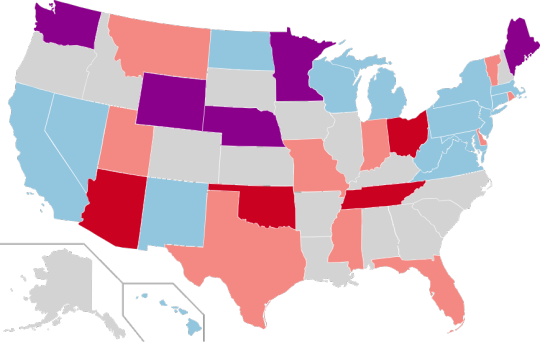
GOVERNORSHIPS
Democratic Party: 20 seats (LOSS of 9)
Republican Party: 23 seats (GAIN of 3)
Reform Party: 7 seats (GAIN of 7)
Independent: 1 seat [Lowell Weicker, CT] (LOSS of 1)
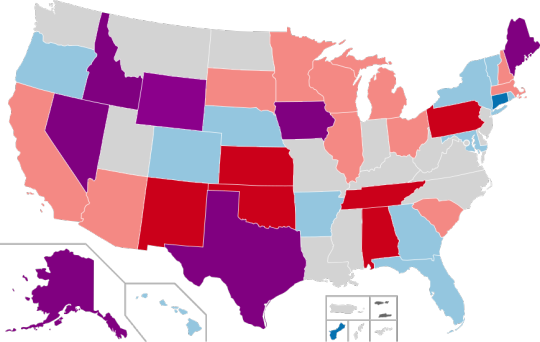
3 notes
·
View notes
Text
Undo my ESC
Good evening, folks! If you saw my first instalment of “Undo my ESC”, the annual feature where I make a year’s Eurovision better for me by making alterations in each country, you might have thought that ESC getting cancelled had dulled my edge, since, comparing to usual standards, I hardly changed much at all there. Well, that’s because, once again, we have seriously uneven semis, and Semi #1 would have been killer, whilst Semi #2 would have been dead. Here is what Í would have done to even those semis up!
🇦🇱 Albania: The Albanian delegation had seemingly done all it could to wash its hands of, well, two years of comparatively excellent results with authentic, melancholically poëtic and qualitative tracks, namely Malland Ktheju tokës. They brought in Byuckman, in whose interest it is for the contest to become as generically “radio-friendly” as possible, and the genius who brought us lyrics like “this is love/rain falls from above”. As judges. Of a serious musical festival.
The foreign jurors did as expected, and voted for the appointed “bop”, but were foiled, however, by one of the minority Albanian jurors on the panel who put it low in her ranks. An actual renowned music professor who got called all the names under the sun for doing so. And so, to an ensuing shitstorm, the classical and powerful Shaj prevailed instead. Unfortunately, the battle was won but the war was lost, because the representative herself took the lessons of 2018-9, threw them down the aeroplane toilet on the way to LA, and ripped the spirit out of the song, reverting back to the previous Albanian trend of terrible “revamps” and laboured translations into English. The result, Fall from the sky, is but a husk of the original. In my ESC, I’d probably simply keeping the original version of Shaj, which was my uncontested #1 of all songs, but part of me would opt for Ajër, which I love almost as well but which doesn’t carry the baggage of hanging over my head like the sword of Democles this entire season.
🇦🇲 Armenia: I’ve more often than not loved the entries of Hayastan, from the joyous Jan Jan to the soaring Fly with me and defiant Walking out. To say they took a step back this year is kind – it was more like a powerful jump backwards that landed them in the nearest ocean, where they sank like a stone. It was one of the most singularly unpalatable NFs that I have ever watched in this era. Rather than retraumatise myself by going into detail about it, I’ll just say, I would have sent Srbuk or Artsvik again to get the top 10 that I feel both warranted!
🇦🇹 Austria: What a journey for Österreich. From Conchita to this guy, a perky homophobe who explicitly said he wished his kids would not turn out to be gay. He comes up with a third-rate impersonator of a third-rate Benjamin Ingrosso impersonator’s third-rate impersonation of a Timberlake b-side. I would throw that in the bin and invite Pænda back from last year for a shot at redemption after her gorgeous Limits got slept on in 2019.
🇧🇬 Bulgaria: Some people had the neck to say to me “who needs Hungary when Bulgaria is coming back?” Well, I do. Hungary were constantly in the top of my rankings, and just quietly and consistently brought quality. Bulgaria has brought me one good thing – Poli Genova’s œuvre – and a tonne of hype. Their song this year was one of the favourites, and I still can’t wrap my head around how other than the force of PR. It’s a bizarre, unsettling combination of passive-aggressive “look how much you’re making me hurt myself” lyrics with Disneyish saccharine accompaniment, topped off with a key change?! For want yet again of a national final, I would bring Poli back – third time even luckier?
🇨🇿 Czechia: The Bohemians (and Moravians) keep it contemporary but superficial for a third year running, although, thankfully, for the first time since they began doing national finals, we finally have a song without a dubious attitude towards women in the lyrics. Not that there is much to analyse in those lyrics. It’s a merely ok song for me, no better, no worse: a superior alternative would have been Barbara Mochowa’s lush and contemplative second effort, White and black holes, or the glorious 90s British indie-influenced All the blood.
🇩🇰 Denmark: Did Denmark confound international monitors into calling it the world’s happiest country by exposing them to the relentlessly cheery songs that they pick for Eurovision lately? And yet – I really do say yes to Yes, To a certain extent, to a limited amount of exposure, and despite the fact that it leans a little too hard into the territory of sounding like a second Little talks. It was one of the few good songs from DMGP – I also liked the 80s shoegaze-ish Den eneste goth– and I feel so mad at DR that they won’t give Ben and Tan a guaranteed second shot to represent their country after they won in front of an empty crowd.
🇪🇪 Estonia: The days of Eesti being Beesti seem like from a distant memory to me, but there was some quality and quirkiness in Eesti Laul, buried under mountains of beigedom, like the rich-voiced Egert Miller’s soulful Georgia, the jazzy Write about me, or the feisty earworm that was Ping pong. Instead, we got a dreary dirge with sub-Hallmark lines about wot luv is, which would have sounded dated in a contest 30 years ago, sung by a repugnant guy who tried to get people to vote for him last year by leaning on the idea that he was the “only true Estonian.” I’d have Egert get his rightful place as Jüri Pootsmann’s spiritual successor.
🇫🇮 Finland: I was one of the few to be jubilant when a bizarre ode to an Italian porn star with a backing track sounding like a violated version of Eläköön elämä came second in the polls to its spiritual opposite: a shy and rather awkward guy singing a quietly moving song about the passing of time. I love Looking back and wouldn’t change a thing.
🇬🇪 Georgia: You never know what to expect from Georgia, except the unexpected, and yet even I was surprised by what they came up with: a close-shaven guy with veins popping in his head screaming “why don’t you love meeeee?” to a rocky, electronic backdrop. Me being me, I actually do like it a lot. “Take me as I am” sounds like a veiled potshot at the big 5 and a vindication of Georgia’s “keep it weird, send what we want” philosophy. I could suggest that the lyrics, that sound like those of a spurned angsty teen, change a bit, but that would be defeating the purpose of Georgia: one takes them as they are.
🇬🇪 Greece: So, somehow, despite S!STERS coming dead last with 0 pts in the televote last year, using exclamation marks to substitute the letter I is now a thing in Eurovision with the advent of Superg!rl. I spent an hour watching folk waffle on in Greek in its reveal show only for them to reveal the song literally at the very end, so after that, it was a little underwhelming, and nowhere near as good as Better love in 2019. I don’t hate it – and the music video’s concept of her being an amazing superhero who can change the world, but instead she’s stopping people slipping over bananas and rescuing cats from trees is weirdly endearing, so it can stay, but I’d improve the lyrics, particularly in the chorus. “I’m a supergirl, supergirl, in a crazy world, crazy world” is not much higher than “this is love, rain falls from above” in historically bad Greek lyrics at ESC.
🇮🇸 Iceland: Daði Freyr came back from near-victory with the delightful Is this love, added a lovely inspiration in his newborn daughter to a similarly funky and playful track, and came out with Think about things. Unlike what usually happens with songs that are a little bit odd, I was positively surprised to see it walk the NF, and become a phenomenon even outside the ESC fandom. This was perfect and joyous from beginning to end. I hope Iceland will not be like the other Nordics, and will invite Daði directly back
.🇱🇻 Latvia: I have come to enjoy the bizarre chaötic energy of Still breathing, It’s a hot mess, but I take weird over dull any day. It wasn’t my favourite in Supernova – that would be the effortlessly cool Polyester, an earworm with a social conscience, written about the cost of fast fashion but dismissed by many people as “she luvs t-shirts song lol”. Given that Samanta Tina tried over half a dozen times to go to ESC, finally won and then had the chance ripped out of her hands by the cancellation, I don’t have the heart to remove her from my ideal ESC 2020 though. She stays, but maybe the staging changes? It’s odd to have what you believe is a feminist anthem but then relegate your backing singers to in the distance, their faces shielded away.
🇲🇩 Moldova: Life is too short to follow Moldovan national finals, especially when you know, lately, that whoever is backed by the hilariously inaptly named Dream team will win there. They are like a parasite, sucking out the colour and fun out of a country that once had plenty of both – cross-reference Hora din Moldova or Lăutar to name just two examples. I guess out of an uninspiring lineüp, I’d go for Moldoviţa for having at least a hint of the brassy folk that used to be their calling card.
🇵🇱 Poland: Speaking of calling cards, after a one year hiatus with an arresting combo of white voice and rocky instrumentation, Poland has returned to what it has most often done in recent years – presented us with an absolute dirge, Empires, which seems like it was written by an unenthusiastic English student whose homework assignment (for which they received a generous C-) was to write a poëm with a bunch of metaphors “we’re moths to a flame, birds to a pane of glass, gasoline and a match”. Despite having a big music industry from which to choose many gems, Poland offers me little alternative choice given that there were only three songs in their grand final – one by the Czech representative last year who, as you might guess from what I said literally a sentence up, isn’t even Polish!Horny Elf, who’s contractually obliged to write only creepy lyrics for songs, tried to represent Polska with a song inspired by a true-life situation where he went around Tel Aviv with a cardboard cutout of one of the hostesses of the show. It’s a love song inspired by gallivanting around with a piece of cardboard. Addressed to that actual hostess. And it’s an almighty earworm that hasn’t escaped my mind since. Amazingly, his Lucy would be my Polish representative.
🇵🇹 Portugal: Portugal is another country beloved by me by for dancing to the beat of its own drummer, or perhaps, rather shedding tears to the strumming of its own fado guitar. They struggled being different, they won being different, and for the last few years they’ve struggled again, despite having a lot of support for both O jardim and Telemóveis amongst fans. This year, the televote went for one interesting song, the charmingly Gallic, accordion-drenched Passe-partout, a song about a cultured girl shaking off her boorish ex who could “never even get into Piaf”, whilst the jury got behind another interesting song, Gerbera, an entrancing, arresting and poëtic song laden with metaphor about the idea of music competing itself. This let Medo de sentir,second in both polls, turn silver into gold. It’s a lovely, heart-felt track, but rather unexceptional - I would have had one of the other more singular songs win.
🇸🇲 San Marino: The weird boil on the face of ESC that somehow never pops, SM is back after its bewildering qualification with a tone-deaf dentist wailing to a microwaved disco song… with something actually palatable, sort of. The aptly named Freaky is dated, odd, overly busy, but Senhit has a lot of charisma, and the idea of “break[ing] all the rules, mak[ing] up some new [ones] and destroy[ing] all of them too” and “life goes by too quickly not to be freaking it up”, well, maybe we do get on board.
🇷🇸 Serbia: Serbia is usually a byword for quality at the contest – they won with one of the best 21st century winners hands down in Molitva, and also sent some of the most beautiful compositions in the contest’s history at the hands of Željko. This year, they decided to join in the leitmotif of reliable countries sucking by sending a group that sound like a third-rate mid-2000s girl band from Transnistria when beautiful songs like Cvet sa Prokletija were right there.
🇨🇭 Switzerland: Fair play to the Swiss for not doing a Cyprus and leaning in on their success with their male Fuego, She gat me, and instead going in a completely different direction with this moody effort. I’m not entirely convinced by the teenage emo-ish lyrics or the unnecessary falsetto, but Répondez-moi is a refreshing effort, and has the bonus of being in French too!
And the automatic qualifiers:
🇫🇷 France: You’ve heard of France, right? You know, that wee country south of Belgium, north of Andorra, not much of a music industry… or so you’d think, given that the troolee jeenyuss new delegation, who abandoned their brilliant national final which showcased how diverse and qualitative their music scene is despite it being a huge success in the fandom, and instead reached out to the writer of last year’s last place song for the UK and a few other rentaswedes and they produced something that sounds like a b-side that not even Westlife would have recorded, replete with a stock key change. About as French as IKEA köttbullar. A real shame for one of Europe’s most highly esteemed cultural hotbeds. If they wanted to pick Tom Leeb, who seems like a nice guy and has written some lovely music, he could have made his own song and it would have indubitably been scores better than this.
🇪🇸 Spain: I’m going to apply this to all the automatic qualifiers voting on this semi-final: they scrapped a national final for this? OT was not an ideal format as last year demonstrated with its shit show of contestants sabotaging themselves so as not to get picked for ESC – but still. There’s not much I can say about this other than I don’t like it much and I’d rather Spain return to a proper NF. You don’t spend time trapped on a bus where this song with its torturous falsetto was on replay and emerge with fond feelings.
🇬🇧 United Kingdom: Usually, in this space, I can point to a song that the UK should have sent and that I fell in love with – like I wish I loved you more or You. Once again, though, another big 6 nation scrapped their NF after tanking it with a bizarre format last year. The BBC said nothing for months, then were unwilling to spend tv time on ESC this year so just blurted out an announcement of an announcement in about 40 seconds after some dance show. And then they dropped this song. It’s… passable at best, with an annoying chorus (especially that beat in “my last… breath”) and a staggering amount of repetition in a song that clocks in at only around 80% of the standard Eurovision song length. James Newman surely could have come up with something better. It’s a baby step in the right direction, but one taken at the shore where you need to start running to avoid getting pulled away in a rip.
9 notes
·
View notes
Link
By Anis Shivani, whose recent political books include Why Did Trump Win?, Confronting American Fascism, and A Radical Human Rights Solution to the Immigration Problem. He is the author of many critically-acclaimed books of fiction, poetry, and criticism, including, most recently, A History of the Cat in Nine Chapters or Less
Forcing the March 17 primaries in Florida, Arizona and Illinois to go forward, despite reports of exceedingly low turnout throughout the day (which miraculously and quite expectedly turned into higher turnouts than 2016 in both Florida and Arizona by the time the final reporting came in), was the last straw. This farce occurred despite the Ohio governor postponing their primary on the same day. This slap in the face of voters was then compounded by the even worse parody of the April 7 Wisconsin primary being allowed to go ahead at the peak of the pandemic, with polling stations vastly reduced (from 180 to just 5 in Milwaukee alone) and absentee ballots often not received or recorded, while maintaining the pretense that somehow all of this constituted a legitimate election.
In the middle of the pandemic, with the entire nation considering a de facto lockdown and many communities already there, the DNC was hell-bent on driving the final nail in the coffin of the youth movement, even though the Sanders campaign had suspended GOTV efforts, for obvious reasons, and even if Biden never really had a presence in any of the latest round of states.
In Maricopa County, Arizona, where many polling stations were shut down, in-person turnout was reportedly higher by 10,000 people than in 2016! And that’s just one representative example from the March 17 primary states. Furthermore, the DNC threatened the remaining primary states against postponing their elections for health reasons, preempting moves similar to those made by Louisiana, Georgia and others. The stage is being set for a virtual convention, followed by the possible resurgence of the illness in the fall to orchestrate a virtual general election. Social distancing has come in handily as the most convenient antidote to political solidarity. Biden has already made it clear that he’s not the least bit interested in making any real overtures toward bereft progressives, just as Hillary wasn’t after her forceful seizure of the nomination in 2016.
When they stopped counting the vote in Iowa, depriving the leading candidate of essential momentum, it was a clear indication that once again the party establishment would do everything to manipulate results in favor of yet another neoliberal avatar bound to lose to Trump in an ignominious landslide—which is actually what the Democratic party establishment wants, four more years of their demonized opponent rather than the tiniest return toward social decency. Nothing about the coronavirus changes this essential dynamic.
That’s how bad the Democratic party has become, blatantly tipping the scales toward their favored outcome in order to maintain oligarchic control, and they expect us to Vote Blue No Matter Who?
We’re asked to believe that the candidate who supported ordinary people at the grassroots level all across the country, by lending crucial support to strikesand direct action, spawning innumerable viable candidacies at the local and state levels, and regularly summoning many thousands of people to populist rallies calling for basic human decency, was easily defeated by a cognitively challenged Wall Street shill who has backed every economic and foreign policy barbarity of the last 50 years, and who cannot be put in a small gym with a few dozen people without descending into furious spittles of verbal aggression.
We’re supposed to trust that the candidate with a pervasive national presence for the last five years was suddenly, in a matter of 72 hours, annihilated by the geezer who had zero volunteers, staff or advertising in any of the states he miraculously turned around by 20, 30 or 40 points.
It’s time to put an end to this sham, because we can’t accede to this level of duplicity without ourselves becoming complicit in the madness. Trump essentially terminated the neoliberal Republican party in one election cycle, but because the Democratic party establishment is more entrenched and dangerous, the prime carrier of the neoliberal virus to which the Republicans are just accessories, it is the more difficult enemy to beat.
To recap some of what we have seen from the great minds trying to herd us all into submission toward Hillary 2.0, the dementia version:
· Herd 29 Trojan horses into the race, all pretending to be some version of or alternative to the clear ideological victor from 2016, and all of them unmasking themselves at appropriate stages of the race (three of them at the last moment before South Carolina) in order to maximize damage to one candidate alone.
· Insist on a series of parodic debates orchestrating various degrees of hostility toward the lone populist, and focusing outlandish attention on marginal candidates rather than giving the front-runner his due.
· Engineer the Iowa vote-counting catastrophe without anyone taking responsibility, and DNC chair Tom Perez not only not resigning but feeling empowered to engender further chaos.
· Repeat all the instances of voter suppression in close simulation of all the 2016 states, as if to thumb their noses at any semblance of voting integrity.
· Be part of closely coordinated media campaigns harping on electability, centrism and moderation, to the point where the liberal media (the Times, CNN, MSNBC) become indistinguishable from campaign opponents and the party apparatus. For the first three months of the year, the New York Times turned into a chorus of single-minded “Never Bernie” propaganda, exceeding even their “Never Trump” loathing of four years ago.
· Recruit Barack Obama to save Biden’s hide when he remained the last one standing, with the same ominous figures from 2016 (Jim “there will be no free education” Clyburn, Harry “get the culinary workers to caucus for Hillary” Reid, and others) reprising to the finest detail the same walk-on bits they played last time.
· Keep changing debate rules, by permitting entry to a last-minute white knight in the form of Michael Bloomberg, and the more recent rule change to prevent Tulsi Gabbard the opportunity of taking down Biden.
· Keep the option of cheating the delegate leader at the convention alive throughout the campaign, rather than stamping it out as a no-go in order to preserve the credibility of primary voting.
· Express no displeasure at clear voter suppression in Texas and California, or curiosity about strange exit poll versus final results in Virginia, Massachusetts, Maine and Minnesota, which showed unprecedented swings toward Biden.
Is this enough manipulation for you?
Sanders more than abided by party decorum for the last four years. Ever since he endorsed Hillary Clinton in 2016, and later yielded to Chuck Schumer’s request to join the senate leadership, he has been the most faithful of team players, observing every nicety and going along with the party line to the extent that there is no direct contradiction with his principles. The least he could have expected in return was a token amount of fair play, to let his social welfare philosophy compete on equal grounds with neoliberalism, yet this was vehemently denied.
At this point, is he obligated to play by the rules? Are we, if we are to draw obvious conclusions from the evidence at hand?
The Democratic party would much rather see Trump reelected by nominating a flawed neoliberal candidate with as much baggage and who is as associated with the recent Clinton failure as is Biden. Think about it: the party we’re supposed to get behind actually prefers fascism over the mildest concessions to social democracy, in order that the entire power structure might persist unchanged. For the sake of denying the slightest help to poor, debt-burdened, sick and unemployed people, this party would rather have untrammeled white nationalism, immigrants in concentration camps, and accelerated income inequality, as though we could sustain any more of it than we already have.
To defeat a handful of broadly popular proposals to address economic inequality, the Democratic party facilitated the entry of a former Republican mayor who administered the harassment of Muslims and minorities after 9/11, who gave over his city to unaccountable developers and oligarchs, and who happens to be the world’s ninth-richest person—not just a billionaire, of the kind Sanders is railing against, but one 60 times over.
And when that didn’t fly, because of said plutocrat’s manifest misogyny, racism and class privilege, they went back to their original choice, the freewheeling politico Wall Street loves to love, the senator from MBNA, the secret manipulator behind every bad trade deal and Wall Street giveaway and incarceration mania and war of choice of the last 50 years. The party Sanders has chosen to be loyal to knows that either of those candidates, the Manhattan multi-billionaire or the Delaware political enabler, would handily lose to Trump, but the idea is to keep playing the game, to engage us all in a performance that pretends to be even-handed. We wait patiently for health care and public education and a living wage, while we die in the meantime.
The party of death has demonstrated again and again in this primary campaign that its sole objective is to discredit left populism, even if it means abetting the growing dominance of fascist populism. The party we’re supposed to fall behind is the real facilitator, not the Republican party, because it is actively preventing an electable alternative to Trump, as shown in all the polls of the last five years.
The “woke” wing of the Democratic party—which is identical to the neoliberal wing in acting all high-and-mighty toward working-class folks, otherwise known as deplorables—precisely duplicated its machinations from 2016, when Hillary Clinton was said to be the victim of the angry Bernie Bros, a more ridiculous myth than which was never heard in a presidential campaign.
The woke crowd, who universally refused to support Sanders (whose campaign is a sincere homage to the Poor People’s Campaign run by Martin Luther King, Jr., or FDR’s economic bill of rights, or Lyndon Johnson’s Great Society program), got behind a series of identity politics-driven candidates, culminating in the last one to leave the race, who immediately got busy gaslighting the Sanders movement for its alleged misogyny. The woke wing was a fraud all along, they never did care to help actual working people with actual debilities. We knew it in 2016 and we know it even better now.
All the fallacies the Democratic party has exploited over five decades reached an extreme form of hypocrisy in the 2020 campaign. The least electable candidates were professionally sold as the most electable ones. Extremism on behalf of inequality and deprivation of basic human rights was packaged as moderate centrism. Sustained media campaigns were run against anyone questioning these straitjackets of thought, labeling us enemies of the people for wanting to help the people.
Emerging from his year-long sloth, Biden made it his mission to trash every element of Sanders’s “political revolution,” even in its most benign demands for a level playing field, which was the sum of the political gangsterism he so adeptly deployed at the March 15 debate, knowing he had the full backing of the party in shunning any move toward the kind of universal programs young voters demand.
Would Sanders supporters not be justified in abandoning this zombie party once and for all, if we do not end up with a fair electoral outcome, as it looks like we’re not going to while this primary fizzles out to an uncertain close? Are we not morally obligated to look for an alternative beyond, past and around this failed shell of a party?
In 2004 and again in 2016 they ran empty, fake, invisible campaigns once the primaries were over, with John Kerry and Hillary Clinton literally disappearing from the campaign trail for weeks at a time. They’d rather have Bush reelected then, and Trump reelected now, than raise the minimum wage to $15, make public college free again, or do something to save the planet from its runaway environmental crisis. While Sanders was responding like FDR II to address the public health emergency, Biden was nowhere to be seen.
We learned during this campaign that the all-time great woke candidate beloved of the wine cave class, namely the president upon whose nostalgic fumes we wish to resurrect a ghostly figure, is more willing than anyone else to stop the first stirrings of social democracy and do everything he can to maintain the chokehold of neoliberalism or neofascism.
The clarion call issued by the “Democratic” president of surveillance, wars, deportation and budget cuts appealed to the lowest instincts of career politicians in South Carolina and across the country as they forcefully jerked us back to where we were supposed to stay. This former president, like the recent troop of candidates, is explicitly against Medicare for All, and every other basic demand this moment of social distress cries out for. Biden and his cronies in the party are willing to go no further than trying to add a public option to the Affordable Care Act; even after the virus escalation, universal programs of the kind Sanders’s movement calls for are nowhere within range of their consideration.
The Democratic party wants to crush the joy and life out of youth, pretending that they don’t come out to vote, and that the entire machinery of politics should be aimed at keeping the country delicately balanced between one half meritocrats and one half deplorables, appealing to a minute number of antiquated voters in Ohio and Florida in order to maintain policy stasis. They gaslight us into thinking that actual social justice aspirants of diverse races and backgrounds, rather than the fake white woke influencers, are the real problem because of our hostility. They impose “party unity” and discipline in the service of continuing the very power structure that has given us unsustainable debt and unaffordability of basic human conveniences. When confronted by enthusiastic participation in Democratic primaries, mainly the responsibility of one Bernard Sanders of Vermont, they counter with the embodiment of the darkest hells of plutocracy, namely Michael Bloomberg. As expected, they have already used the coronavirus crisis to shut down any remaining trace of political idealism, because in this moment of emergency we cannot expect anything better than to bow down to the former president’s faithful old lapdog.
The Democratic party of 2020, after more than 50 years of succumbing to a murderous form of capitalism, is not just a flawed vehicle for any sort of political renaissance. Why should we legitimize them by leaping around their phantom carousel, wearing colorful costumes and clown hats on the fairgrounds, when they won’t give us a ticket, when they tear it up if we do have one, and when there’s always a guard hanging around to bash our skulls in case we utter a cry of joy at some little win?
They are all but compelling us to leave the party. Will we have the imagination to do so at last in a mass exodus?
#joe biden#bernie sanders#bernie sanders for president#hillary clinton#john kerry#barack obama#barackandmichelle#dnc#dnc 2020#2020 presidential primary#2020 presidential debates#2020 presidential candidate#2020 presidential race#voter fraud#voter suppression#medicare for all#democrats#democratic primary#democratic candidates#democrazia#democrap
4 notes
·
View notes
Text
Bolsonaro leads Brazil’s presidential race with right-wing populist pitch
By Anthony Faiola and Marina Lopes, Washington Post, October 4, 2018
SAO PAULO, Brazil--Brazil for years reveled in its image as a post-racial, left-leaning society. Now Jair Bolsonaro--a far-right outsider who says he “loves” President Trump--has surged to the front of the pack in Sunday’s presidential election, sharply dividing Latin America’s largest nation.
To tackle runaway crime, Bolsonaro says, police should gun down more criminals. “A gay son is the result of a lack of beatings,” he once quipped, and insists that homosexuality should not be discussed in elementary schools.
He once said that women--because they get pregnant--deserve less pay than men. He has called some minorities fat and lazy.
Like Trump, he embraces social media to reach legions of loyal followers. His rallies have become outlets for white men rattled by social and economic change. He has vowed to drain the swamp in the capital and make Brazil “great.”
“It’s going to be beautiful,” the front-runner’s 34-year-old son, Eduardo Bolsonaro, said while envisioning his father’s presidency at a rally last week. “It will be just like Trump in the United States.”
As this nation of 208 million goes to the polls Sunday, Brazil is a polarized, angst-filled place. The economy is floundering. Huge swaths of its political class are tainted by corruption. The homicide rate has reached epic highs.
Bolsonaro, 63, has advanced with a Brazil-first campaign that attacks the traditional press while grabbing headlines with tough talk and his own set of alternative facts.
Much like Trump in 2016, Bolsonaro is winning support from many voters who are turning to him despite his words on minorities and women, not because of them. His pledge to crack down on crime and political corruption and prevent the return of a leftist government are resounding with millions who see him as the last, best chance for law and order. He has managed to portray himself as an outsider despite his 27 years as a lawmaker in Congress.
Bolsonaro in recent months has sought to tone down his most controversial rhetoric, praising Brazil’s cultural diversity in a tweet Thursday and softening his stance on gender inequality, in what analysts say is an attempt to increase his electability.
“He’s not the savior of the country, but to beat the communists in the Workers’ Party, he is the best option,” said Danilo Monato, a black, 30-year-old physical education teacher who attended the recent Bolsonaro rally.
In much of Latin America, polls show, Trump is desperately unpopular. But Bolsonaro and his supporters--who sometimes fly American flags at rallies--view the U.S. president as a political touchstone.
Bolsonaro’s similarities with Trump are “conscious and deliberate,” said Guilherme Casarões, a comparative politics professor at the Getulio Vargas Foundation, a university in Sao Paulo. “Five years ago, he was just another congressman with anti-gay views. Now Bolsonaro, like Trump, has become a larger-than-life figure.”
He continued: “Bolsonaro uses well-crafted rhetoric--his slogan is ‘Brazil before everything, and God above all.’ He has been able to reach out to different groups of voters who feel abandoned by the political class. They are now blind to the negative things he says and does, and tend to overlook any aspect that speaks against their candidate.”
Bolsonaro has embraced the politics of fear. He demonized his opponents on the left as corrupt, inept radicals and his foes on the right as weak centrists unable to “strongly” represent the conservative cause.
Conspiracy theories rule his world: If he loses, it will be only because of a plot to steal the presidency from him, he says.
“I will not accept an election result that is not my own victory,” Bolsonaro said in a television interview last month.
His talk of bringing back family values has been music to the ears of conservative Catholics and evangelicals, even though he is now on his third wife. After an unsuccessful assassination attempt last month--a man stabbed Bolsonaro in the abdomen at a rally--some Brazilians even tweeted Bible verses and proclaimed his survival a divine sign.
Like Trump, Bolsonaro was initially underestimated by Brazilian pundits, who laughed off his candidacy. They aren’t laughing now. A former army captain whose running mate is a retired general, Bolsonaro has lavished praise on the 21-year, right-wing military dictatorship that ruled Brazil until 1985. If he wins and finds himself unable to cobble together a majority in Congress, some observers fear he may back military intervention and seize authoritarian powers.
Bolsonaro has rejected such concerns. “If one day the military comes to power, it will be through a vote,” he said at a march in June.
A new poll from respected firm Datafolha released Thursday shows Bolsonaro with 39 percent of the vote, compared with 25 percent for Fernando Haddad, the candidate representing the Workers’ Party. In Brazil’s electoral system, a candidate needs more than 50 percent to win--a figure none of the 13 aspirants in the race is expected to reach Sunday. That would set up an Oct. 28 runoff between the two top finishers, in which Bolsonaro would probably be in a dogfight with Haddad.
Part of Haddad’s problem is his role as a stand-in for former president Luiz Inácio Lula da Silva. Lula, as he is widely known here, was barred from the race after he was sent to prison for 12 years for his involvement in a massive corruption scandal involving construction company bribes.
Haddad has met with investment bankers and is considered more moderate than most members of his party, which has not endeared him to the more militant leftists. Nonetheless, investors fear he won’t be willing to pass crucial reforms to the country’s pension system to avert a financial crisis. Some voters also worry that Haddad--whose slogan is “Lula is Haddad”--will adopt more-radical policies as president if Lula wishes it.
The chances of a Bolsonaro victory, meanwhile, are stoking fears among liberals here and abroad, turning Brazil’s election into a globally watched race. Celebrities including Madonna, Cher and the British actor Stephen Fry have denounced Bolsonaro. In Brazil, social movements against him have sprung up--including one involving hundreds of thousands of tweets under the hashtag #elenao, or #NotHim. Last weekend, tens of thousands of women, blacks, gay people and indigenous activists jointed in anti-Bolsonaro street protests.
5 notes
·
View notes
Text
How Did Republicans Do In The Primaries
New Post has been published on https://www.patriotsnet.com/how-did-republicans-do-in-the-primaries/
How Did Republicans Do In The Primaries
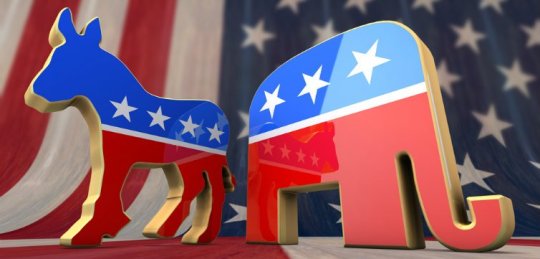
Allegations Of Inciting Violence
Inside Texas Politics: What did Texas Republicans, Democrats do right this election cycle?
Research suggests Trump’s rhetoric caused an increased incidence of hate crimes. During his 2016 campaign, he urged or praised physical attacks against protesters or reporters. Since then, some defendants prosecuted for hate crimes or violent acts cited Trump’s rhetoric in arguing that they were not culpable or should receive a lighter sentence. In May 2020, a nationwide review by ABC News identified at least 54 criminal cases from August 2015 to April 2020 in which Trump was invoked in direct connection with violence or threats of violence by mostly white men against mostly members of minority groups. On January 13, 2021, the House of Representatives impeached Trump for incitement of insurrection for his actions prior to the storming of the U.S. Capitol by a violent mob of his supporters who acted in his name.
Who Can Vote In A Primary
Only Democrats can vote in the Democratic Primary.
Only Republicans can vote in the Republican Primary.
The last day to register to vote before the Primary is the 4th Saturday before the Primary.
The deadline to change party affiliation before the Primary is the last Friday in May.
You can register to vote and change your party affiliation after the Primary.
Results Of The 2016 Republican Party Presidential Primaries
Donald Trump
e
This article contains the results of the 2016 Republican presidential primaries and caucuses, the processes by which the Republican Party selected delegates to attend the 2016 Republican National Convention from July 1821. The series of primaries, caucuses, and state conventions culminated in the national convention, where the delegates cast their votes to formally select a candidate. A simple majority of the total delegate votes was required to become the party’s nominee and was achieved by the nominee, businessman Donald Trump of New York.
The process began on March 23, 2015, when Texas SenatorTed Cruz became the first presidential candidate to announce his intentions to seek the office of United StatesPresident. That summer, 17 major candidates were recognized by national and state polls, making it the largest presidential candidate field for any single political party in American history. The large field made possible the fact that the 2016 primaries were the first since 1968 in which more than three candidates won at least one state.
Recommended Reading: Should Republicans Vote In Democratic Primary
May 2016: Trump As Presumptive Nominee
142 delegates were awarded between the Indiana primary and the final primaries in June; however, with Trump the only candidate remaining, Washington, Oregon, West Virginia and Nebraska became essentially uncontested, although Cruz and Kasich remained on the ballot. Trump won handily in West Virginia, Nebraska and Oregon, although Kasich received one delegate from West Virginia and five in Oregon, while Cruz took five in Oregon as well. The next week, Trump won decisively in Washington State, taking 76% of the vote and 41 of 44 delegates, with the other three uncommitted.
May 1024 results 11%
After becoming the presumptive Republican nominee, Trump said regarding the Republican primaries: “You’ve been hearing me say it’s a rigged system, but now I don’t say it anymore because I won. It’s true. Now I don’t care.”
On May 26, 2016, the Associated Press announced that Trump had passed the threshold of 1,237 delegates required to guarantee his nomination, thanks to unbound delegates from North Dakota who declared their support for Trump.
Professional Input Checks The Power Of Billionaires And The Media

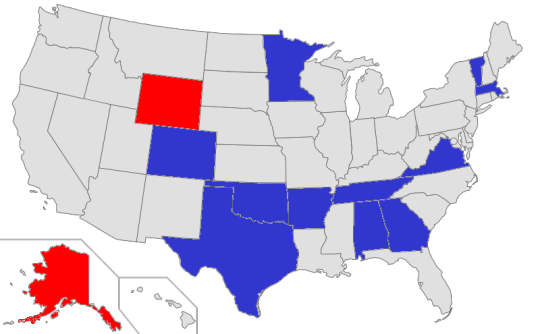
The conventional assumption that primaries are less elite than party selection overlooks the way todays primaries actually work. Thanks to court decisions such as SpeechNow.org v. Federal Election Commission, there is today no limit on the size of contributions to independent groups; the groups, in turn, are free to support and oppose candidates provided that they not coordinate their activities with the candidates and parties. In other words, todays campaign-finance rules funnel vast sums of unaccountable money to the political systems least accountable actors.
odays campaign-finance rules funnel vast sums of unaccountable money to the political systems least accountable actors.
That said, even if small donors were a perfectly representative group, they would still provide a pathway around gatekeepers, and that is a mixed blessing. True, candidates who rely on small donors are less beholden to big donors and special interests, which may make them more independent-minded; also true, they are less beholden to their political peers, party leaders, and important constituencies, which may make them more reckless and demagogic.
Then there are the media, whose power in influencing candidate choice has grown enormously since the McGovern-Fraser reforms. Writing as long ago as 1978, Jeanne Kirkpatrick tartly observed:
Things have only gotten worse in the transition from Walter Cronkite to Sean Hannity and todays bevy of extremist internet sites.
Also Check: What Major Cities Are Run By Republicans
Sen Josh Hawley Of Missouri
Though controversial, Hawley, 41, is a fundraising machine and hes quickly made a name for himself. The blowback Hawley faced for objecting to Bidens Electoral College win included a lost book deal and calls for him to resign from students at the law school where he previously taught. His mentor, former Sen. John Danforth of Missouri, said that supporting Hawley was the biggest mistake Ive ever made in my life.
Still, he brought in more than $1.5 million between Jan. 1 and March 5, according to Axios, and fundraising appeals in his name from the National Republican Senatorial Committee brought in more cash than any other Republican except NRSC Chair Sen. Rick Scott of Florida. Just because youre toxic in Washington doesnt mean you cant build a meaningful base of support nationally.
One Republican strategist compared the possibility of Hawley 2024 to Cruz in 2016. Hes not especially well-liked by his colleagues , but hes built a national profile for himself and become a leading Republican voice opposed to big technology companies.
Hawley and his wife, Erin, have three children. He got his start in politics as Missouri attorney general before being elected to the Senate in 2018. Hawley graduated from Stanford and Yale Law.
Statehood And Indian Removal
Defense of Florida’s northern border with the United States was minor during the second Spanish period. The region became a haven for escaped slaves and a base for Indian attacks against U.S. territories, and the U.S. pressed Spain for reform.
Americans of and began moving into northern Florida from the backwoods of and . Though technically not allowed by the Spanish authorities and the Floridan government, they were never able to effectively police the border region and the backwoods settlers from the United States would continue to immigrate into Florida unchecked. These migrants, mixing with the already present British settlers who had remained in Florida since the British period, would be the progenitors of the population known as .
These American settlers established a permanent foothold in the area and ignored Spanish authorities. The British settlers who had remained also resented Spanish rule, leading to a rebellion in 1810 and the establishment for ninety days of the so-called Free and Independent Republic of on September 23. After meetings beginning in June, rebels overcame the garrison at , and unfurled the flag of the new republic: a single white star on a blue field. This flag would later become known as the “”.
Some Seminoles remained, and the U.S. Army arrived in Florida, leading to the . Following the war, approximately 3,000 Seminole and 800 Black Seminole were removed to . A few hundred Seminole remained in Florida in the .
Recommended Reading: How Many Democrats Have Been President Vs Republicans
Anger At Past Outside Interference
The discontent over unaffiliated voter participation in partisan primaries stems from the 2016 approval of two ballot measures allowing unaffiliated voters to select one of the two partys primary elections to cast a ballot in. Before the change, unaffiliated voters had to sit on the sidelines for primaries.
From 2010 through 2016, Republican primary voter turnout outpaced that of Democrats. But in 2018 and 2020, the first two years unaffiliated voters could participate in primaries without affiliating with one of the two major parties, participation in the Democratic primaries soared.
Meanwhile, more Coloradans are becoming unaffiliated voters, reaching 43% at the end of July, while the Republican Partys share of voters is decreasing at a faster pace than the Democratic Party.
Colorado candidates can get on the primary ballot by one of two paths. They can be nominated and go through the state caucus and assembly process, where they must get 30% of the vote, or they can gather signatures from voters.
Some GOP candidates have had trouble making the ballot in the past. In 2016 and 2018, scandals over petition signatures foiled one U.S. Senate candidate and led a gubernatorial candidate, Walker Stapleton, to go the assembly route at the 11th hour after initially gathering petition signatures.
In 2020, allegations of fraud arose out of caucuses in Weld and El Paso counties. The state GOP, however, ultimately determined nothing illegal took place in either instance.
Convention And Vp Selection
Midterm elections: Do Republicans have a chance of keeping the House?
The delegates at the Republican National Convention formally nominated Dole on August 15, 1996, as the GOP presidential candidate for the general election. Dole was the oldest first-time presidential nominee at the age of 73 years, 1 month .
Former Congressman and Cabinet secretary Jack Kemp was nominated by acclamation as Dole’s running mate the following day. Republican Party of Texas convention delegates informally nominated Alan Keyes as their preference for Vice President.
Other politicians mentioned as possible GOP V.P. nominees before Kemp was selected included:
Don’t Miss: How Many Seats Do The Republicans Control In The Senate
Just How Bad Was The 2018 Election For House Republicans
On Thursday, Democrat Jared Golden beat Maine Republican Rep. Bruce Poliquin, marking the 33rd seat pickup for Democrats in the 2018 election.
There are seven races in the House left uncalled all are Republican-held seats; Democrats lead in five of the seven. If they win all the races where their candidates are winning at the moment, Democrats will net 38 seats. If they lose them all which is very unlikely they will hold at a 33-seat gain.
In an interview Wednesday with the conservative Daily Caller website, President Donald Trump insisted that by his aggressive last-minute campaigning across the country he had saved House Republicans from seat losses that could have numbered into the 70s. I think I did very well, he concluded.
So did he? As compared to history?
Not really, is the answer.
Theres no question that Trump did not suffer the massive seat loss that his immediate predecessor Barack Obama did in his first midterm election in 2010. In that election, Republicans netted an astounding 63-seat gain, the largest since Democrats lost 72 House seats in the 1938 midterms.
But more broadly, the 33 seat loss by Republicans in 2018 places this election firmly in the upper echelon of House-seat losses by a presidents party in modern midterms.
Read Thursdays full edition of The Point newsletter, and to get future editions delivered to your inbox.
What Do Party Preferences Mean When Listed With Candidates’ Names On The Ballot What Are The Qualified Political Parties And Abbreviations Of Those Party Names
The term “party preference” is now used in place of the term “party affiliation.” A candidate must indicate his or her preference or lack of preference for a qualified political party. If the candidate has a qualified political party preference that qualified political party will be indicated by the candidate’s name on the ballot. If a candidate does not have a qualified political party preference, “Party Preference: None” will be indicated by the candidate’s name on the ballot.
Similarly, voters who were previously known as “decline-to-state” voters are now known as having “no party preference” or known as “NPP” voters.
Abbreviations for the qualified political parties are:
DEM = Democratic Party
Also Check: How Many Registered Republicans In Illinois
Civil War And Reconstruction
American settlers began to establish cotton in north Florida, which required numerous laborers, which they supplied by buying slaves in the domestic market. By 1860, Florida had only 140,424 people, of whom 44% were enslaved. There were fewer than 1,000 free before the American Civil War.
On January 10, 1861, nearly all delegates in the Florida Legislature approved an ordinance of secession, declaring Florida to be “a sovereign and independent nation”an apparent reassertion to the preamble in Florida’s Constitution of 1838, in which Florida agreed with Congress to be a “Free and Independent State.” The ordinance declared Florida’s secession from the , allowing it to become one of the founding members of the .
The Confederacy received little military help from Florida; the 15,000 troops it offered were generally sent elsewhere. Instead of troops and manufactured goods, Florida did provide salt and, more importantly, beef to feed the Confederate armies. This was particularly important after 1864, when the Confederacy lost control of the Mississippi River, thereby losing access to Texas beef. The largest engagements in the state were the , on February 20, 1864, and the , on March 6, 1865. Both were Confederate victories. The war ended in 1865.
It Was An Election For A Mini

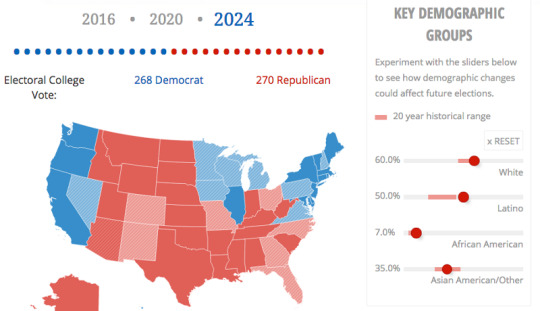
There was some talk that Democrats may have pulled their punches in the 25th district because, after all, the special election was for the remainder of Hills term and the two candidates will meet again in a more consequential rematch where conditions may favor Smith. Over-confidence probably wasnt a problem since signs of a Garcia win were abundant going into the election.
Republicans, of course, busily spun the win into a sign of a Republican resurgence in California and possibly an omen that the GOP will retake the House even as Trump cake-walks to a second term on the strength of a rapidly rebounding economy that he championed even as Democrats pursued perpetual shutdowns. While the results may legitimately indicate that theres no continuing wave from 2018 that will crash with renewed force in favor of Democrats in November, its more likely that we are seeing a reversion to the mean rather than some new pro-Republican wave. There are enough special circumstances surrounding Garcias win to make its recurrence questionable when he appears on the ballot on Election Day with Donald Trump, who remains as unpopular as ever in California.
There is one wrinkle in Garcias special election victory worth a closer look. In 2018 a number of Republican incumbents famously led early on until later-arriving mail ballots swept Democrats into office. There were signs on Election Day that Garcias early lead might be durable, as California political observer Miriam Pawel noted:
Don’t Miss: How Many Registered Republicans In California
What Makes The 2024 Presidential Election Unique
The lead up to the 2024 presidential election is different from past years because of former President Donald Trump. Hes eligible to run for a second term, and has publicly toyed with the idea while also weighing in on other Republicans he thinks could be the future of the party. If Trump does run in 2024, hed start out with unparalleled name ID and massive support, but if he doesnt, the field could be wide open for other Republicans hoping to win over his supporters. President Joe Biden said recently he expects to run for reelection in 2024.
Related
Golden Trump statue at CPAC 2021 was no graven image, according to the artist
This early on, wannabe candidates must raise their profiles, show their commitment to the party, and raise money, one Republican strategist said, to get on peoples radars even when your candidacy is in a holding pattern.
Some of the most visible 2024 presidential candidates will surely flame out long before the Iowa caucus, and theres always the chance that the next Republican nominee isnt yet considered a serious player . Theres a million and one things that will happen between now and then that will shape the race in ways we cant now predict, but the invisible primary that comes before any votes are cast has started.
Heres your very early guide to some of 2024s Republican presidential candidates, based on early polling, interviews with Republican donors and strategists and results from online political betting markets.
The Louisiana Primary System
The Louisiana system, sometimes called the “Cajun Primary,” eliminates the primary election altogether. Instead, all candidates, regardless of party affiliation, run on the same ballot in November. If a candidate receives more than half of the votes, that candidate is elected. If no candidate wins with a majority, the top two vote-getters face off in a December runoff election. Qualified absentee voters receive a ballot for the November election and a ranked ballot for the December runoff, so that they can vote as normal in the general election and then have their ranked ballot count for whichever runoff candidate they ranked highest in the runoff election.
Although Louisiana law refers to the election in November as the “primary” and the December runoff as the “general” election, the November election takes place on the federally mandated Election Day and most candidates win office by receiving a majority vote in that election, so it is best understood as a general election, with the December election as a contingent runoff.
The Louisiana system is sometimes mistakenly equated with the Top Two system, but holding the first election in November and electing any candidate with more than 50% of the vote in that election makes it sufficiently distinct that it should not be understood as a mere variant of Top Two.
Read Also: How Many Republicans Caucused In Iowa
Trump Election Lawsuits Have Mostly Failed Here’s What They Tried
In the Senate, Democrats have so far gained one seat, but they need three with a Biden win to take over the chamber. Democrats still have a chance of doing that with two runoff elections in Georgia. That’s seen as possible, but not likely.
It wasn’t expected to be this way. Democrats had put lots of Senate races in play, ones not expected to go their way at the beginning of the 2020 cycle, places like Kansas and Montana.
To be sure, many of the Senate races were expected to be close, perhaps with razor-thin margins, and a Democrat-controlled Senate was never an assured outcome. But when you look at the average of the polls in the last week of the election versus the ultimate result, it’s clear that Republicans were underrepresented all across the country.
Loading…
All of these races, except Colorado and Alabama, were within single digits in the polls. Colorado, a state Biden won handily, wound up pretty close to the average. Alabama, a state Trump won by a lot, was an even bigger blowout than expected.
Many of the supposedly tightest races didn’t wind up tight at all. Maine is perhaps the most stunning one. Biden won the state by 9 percentage points, but Republican incumbent Susan Collins won reelection by 9 points.
Not only was Collins down by 4 points heading into Election Day in an average of the polls in the week before the election, but she led in just one poll in all of 2020. And that was back in July. That’s one poll out of almost three dozen.
Relationship With The Press
Did The 2014 Primaries Do The GOP Any Good? | Drinking And Talking
Throughout his career, Trump has sought media attention, with a “lovehate” relationship with the press. Trump began promoting himself in the press in the 1970s. Fox News anchor and former House speaker have characterized Trump as a “” who makes controversial statements to see people’s “heads explode.”
In the 2016 campaign, Trump benefited from a record amount of free media coverage, elevating his standing in the Republican primaries.New York Times writer wrote in 2018 that Trump’s media dominance, which enthralls the public and creates “can’t miss” reality television-type coverage, was politically beneficial for him.
As a candidate and as president, Trump frequently accused the press of bias, calling it the “fake news media” and “the .” In 2018, journalist recounted Trump’s saying he intentionally demeaned and discredited the media “so when you write negative stories about me no one will believe you.”
As president, Trump deployed the legal system to intimidate the press. In early 2020, the Trump campaign sued The New York Times, The Washington Post, and CNN for alleged defamation in opinion pieces about Russian election interference. Legal experts said that the lawsuits lacked merit and were not likely to succeed. By March 2021, the lawsuits against The New York Times and CNN had been dismissed.
Don’t Miss: Will Any Republicans Vote To Remove Trump
Garcia Was An Unusually Good Candidate
Republicans lucked into an unusually strong candidate in Garcia, a former Navy pilot running in a district with a significant defense presence, and a Latino in a district whose electorate has become one-third Latino. He managed to beat the previous Republican holder of the seat, Steve Knight, in the February primary in order to win a Top Two position opposite Smith, which was welcomed by Republican strategists. His campaign was well-financed.
Republican Party Primaries 2020
2020 Republican Party primary elections Battleground primaries Primaries by state Submit
Ballotpedia covered every Republican Party state and federal primary in 2020 to highlight the intraparty conflicts that shaped the party and the general election. This page is an overview of those primaries, with links to Ballotpedia’s coverage of all Republican U.S. Senate, U.S. House, and state-level primaries.
to read about Democratic Party primaries in 2020.
You May Like: What Are The Views Of Republicans
Former Us Ambassador To The United Nations Nikki Haley
Haley, 49, stands out in the potential pool of 2024 Republican candidates by her resume. She has experience as an executive as the former governor of South Carolina and foreign policy experience from her time as U.S. ambassador to the United Nations.
Haley was a member of the Republican Partys 2010 tea party class. A former South Carolina state representative, her long shot gubernatorial campaign saw its fortunes improve after she was endorsed by Sarah Palin. Haley rocketed from fourth to first just days after the endorsement, and she went on to clinch the nomination and become her states first female and first Indian-American governor.
As governor, she signed a bill removing the Confederate flag from the state Capitol following the white supremacist attack at the Emanuel African Methodist Church in Charleston. She left office in 2017 to join the Trump administration as U.S. ambassador to the United Nations, and Quinnipiac poll found she was at one point the most popular member of Trumps foreign policy team.
I think that shes done a pretty masterful job in filling out her resume, said Robert Oldendick, a professor and director of graduate studies at the University of South Carolinas department of political science.
Haley criticized Trump following the Jan. 6 attack on the Capitol by his supporters, saying she was disgusted by his conduct. Oldendick said he thought her pretty pointed criticism of the president will potentially cause some problems.
‘im Going To Be In Your Backyard’: Trump Sons Threaten Primaries For Gop Lawmakers

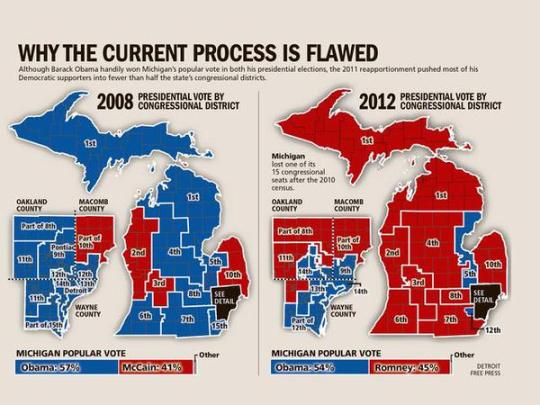
Fox News, which had been carrying the remarks live, dropped its feed of the rally after the expletives uttered by the president’s son aired uncensored.
Donald Trump Jr. speaks Wednesday, Jan. 6, 2021, in Washington, at a rally in support of President Donald Trump called the “Save America Rally.” | Jacquelyn Martin/AP Photo
01/06/2021 11:48 AM EST
Link Copied
President Donald Trumps eldest sons threatened Republican lawmakers at a large rally outside the White House on Wednesday, pledging that their family would continue to dispute the results of the 2020 election just hours before Congress was set to certify President-elect Joe Bidens Electoral College victory.
To those Republicans, many of which may be voting on things in the coming hours: You have an opportunity today, Donald Trump Jr. told the crowd gathered for the Save America March on the White House Ellipse. You can be a hero, or you can be a zero. And the choice is yours. But we are all watching. The whole world is watching, folks. Choose wisely.
Several House Republicans and roughly a dozen senators have announced plans to object to individual states electoral vote counts when Congress meets for a joint session this afternoon. And though their effort to reverse the elections outcome has virtually no chance of succeeding, the president had applied increasing public pressure on Vice President Mike Pence who will preside over the proceedings to attempt to thwart Bidens win.
Recommended Reading: Are There Any Republicans For Impeachment
0 notes
Text
How Did Republicans Do In The Primaries
Allegations Of Inciting Violence
Inside Texas Politics: What did Texas Republicans, Democrats do right this election cycle?
Research suggests Trump’s rhetoric caused an increased incidence of hate crimes. During his 2016 campaign, he urged or praised physical attacks against protesters or reporters. Since then, some defendants prosecuted for hate crimes or violent acts cited Trump’s rhetoric in arguing that they were not culpable or should receive a lighter sentence. In May 2020, a nationwide review by ABC News identified at least 54 criminal cases from August 2015 to April 2020 in which Trump was invoked in direct connection with violence or threats of violence by mostly white men against mostly members of minority groups. On January 13, 2021, the House of Representatives impeached Trump for incitement of insurrection for his actions prior to the storming of the U.S. Capitol by a violent mob of his supporters who acted in his name.
Who Can Vote In A Primary
Only Democrats can vote in the Democratic Primary.
Only Republicans can vote in the Republican Primary.
The last day to register to vote before the Primary is the 4th Saturday before the Primary.
The deadline to change party affiliation before the Primary is the last Friday in May.
You can register to vote and change your party affiliation after the Primary.
Results Of The 2016 Republican Party Presidential Primaries
Donald Trump
e
This article contains the results of the 2016 Republican presidential primaries and caucuses, the processes by which the Republican Party selected delegates to attend the 2016 Republican National Convention from July 1821. The series of primaries, caucuses, and state conventions culminated in the national convention, where the delegates cast their votes to formally select a candidate. A simple majority of the total delegate votes was required to become the party’s nominee and was achieved by the nominee, businessman Donald Trump of New York.
The process began on March 23, 2015, when Texas SenatorTed Cruz became the first presidential candidate to announce his intentions to seek the office of United StatesPresident. That summer, 17 major candidates were recognized by national and state polls, making it the largest presidential candidate field for any single political party in American history. The large field made possible the fact that the 2016 primaries were the first since 1968 in which more than three candidates won at least one state.
Recommended Reading: Should Republicans Vote In Democratic Primary
May 2016: Trump As Presumptive Nominee
142 delegates were awarded between the Indiana primary and the final primaries in June; however, with Trump the only candidate remaining, Washington, Oregon, West Virginia and Nebraska became essentially uncontested, although Cruz and Kasich remained on the ballot. Trump won handily in West Virginia, Nebraska and Oregon, although Kasich received one delegate from West Virginia and five in Oregon, while Cruz took five in Oregon as well. The next week, Trump won decisively in Washington State, taking 76% of the vote and 41 of 44 delegates, with the other three uncommitted.
11%
After becoming the presumptive Republican nominee, Trump said regarding the Republican primaries: “You’ve been hearing me say it’s a rigged system, but now I don’t say it anymore because I won. It’s true. Now I don’t care.”
On May 26, 2016, the Associated Press announced that Trump had passed the threshold of 1,237 delegates required to guarantee his nomination, thanks to unbound delegates from North Dakota who declared their support for Trump.
Professional Input Checks The Power Of Billionaires And The Media
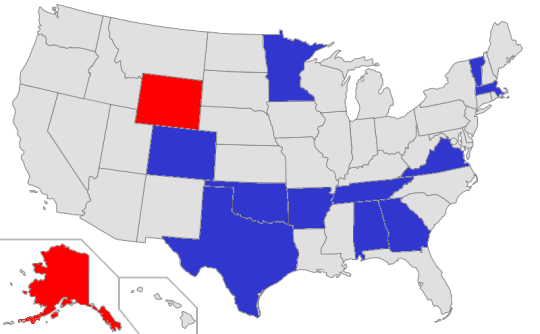
The conventional assumption that primaries are less elite than party selection overlooks the way todays primaries actually work. Thanks to court decisions such as SpeechNow.org v. Federal Election Commission, there is today no limit on the size of contributions to independent groups; the groups, in turn, are free to support and oppose candidates provided that they not coordinate their activities with the candidates and parties. In other words, todays campaign-finance rules funnel vast sums of unaccountable money to the political systems least accountable actors.
odays campaign-finance rules funnel vast sums of unaccountable money to the political systems least accountable actors.
That said, even if small donors were a perfectly representative group, they would still provide a pathway around gatekeepers, and that is a mixed blessing. True, candidates who rely on small donors are less beholden to big donors and special interests, which may make them more independent-minded; also true, they are less beholden to their political peers, party leaders, and important constituencies, which may make them more reckless and demagogic.
Then there are the media, whose power in influencing candidate choice has grown enormously since the McGovern-Fraser reforms. Writing as long ago as 1978, Jeanne Kirkpatrick tartly observed:
Things have only gotten worse in the transition from Walter Cronkite to Sean Hannity and todays bevy of extremist internet sites.
Also Check: What Major Cities Are Run By Republicans
Sen Josh Hawley Of Missouri
Though controversial, Hawley, 41, is a fundraising machine and hes quickly made a name for himself. The blowback Hawley faced for objecting to Bidens Electoral College win included a lost book deal and calls for him to resign from students at the law school where he previously taught. His mentor, former Sen. John Danforth of Missouri, said that supporting Hawley was the biggest mistake Ive ever made in my life.
Still, he brought in more than $1.5 million between Jan. 1 and March 5, according to Axios, and fundraising appeals in his name from the National Republican Senatorial Committee brought in more cash than any other Republican except NRSC Chair Sen. Rick Scott of Florida. Just because youre toxic in Washington doesnt mean you cant build a meaningful base of support nationally.
One Republican strategist compared the possibility of Hawley 2024 to Cruz in 2016. Hes not especially well-liked by his colleagues , but hes built a national profile for himself and become a leading Republican voice opposed to big technology companies.
Hawley and his wife, Erin, have three children. He got his start in politics as Missouri attorney general before being elected to the Senate in 2018. Hawley graduated from Stanford and Yale Law.
Statehood And Indian Removal
Defense of Florida’s northern border with the United States was minor during the second Spanish period. The region became a haven for escaped slaves and a base for Indian attacks against U.S. territories, and the U.S. pressed Spain for reform.
Americans of and began moving into northern Florida from the backwoods of and . Though technically not allowed by the Spanish authorities and the Floridan government, they were never able to effectively police the border region and the backwoods settlers from the United States would continue to immigrate into Florida unchecked. These migrants, mixing with the already present British settlers who had remained in Florida since the British period, would be the progenitors of the population known as .
These American settlers established a permanent foothold in the area and ignored Spanish authorities. The British settlers who had remained also resented Spanish rule, leading to a rebellion in 1810 and the establishment for ninety days of the so-called Free and Independent Republic of on September 23. After meetings beginning in June, rebels overcame the garrison at , and unfurled the flag of the new republic: a single white star on a blue field. This flag would later become known as the “”.
Some Seminoles remained, and the U.S. Army arrived in Florida, leading to the . Following the war, approximately 3,000 Seminole and 800 Black Seminole were removed to . A few hundred Seminole remained in Florida in the .
Recommended Reading: How Many Democrats Have Been President Vs Republicans
Anger At Past Outside Interference
The discontent over unaffiliated voter participation in partisan primaries stems from the 2016 approval of two ballot measures allowing unaffiliated voters to select one of the two partys primary elections to cast a ballot in. Before the change, unaffiliated voters had to sit on the sidelines for primaries.
From 2010 through 2016, Republican primary voter turnout outpaced that of Democrats. But in 2018 and 2020, the first two years unaffiliated voters could participate in primaries without affiliating with one of the two major parties, participation in the Democratic primaries soared.
Meanwhile, more Coloradans are becoming unaffiliated voters, reaching 43% at the end of July, while the Republican Partys share of voters is decreasing at a faster pace than the Democratic Party.
Colorado candidates can get on the primary ballot by one of two paths. They can be nominated and go through the state caucus and assembly process, where they must get 30% of the vote, or they can gather signatures from voters.
Some GOP candidates have had trouble making the ballot in the past. In 2016 and 2018, scandals over petition signatures foiled one U.S. Senate candidate and led a gubernatorial candidate, Walker Stapleton, to go the assembly route at the 11th hour after initially gathering petition signatures.
In 2020, allegations of fraud arose out of caucuses in Weld and El Paso counties. The state GOP, however, ultimately determined nothing illegal took place in either instance.
Convention And Vp Selection
Midterm elections: Do Republicans have a chance of keeping the House?
The delegates at the Republican National Convention formally nominated Dole on August 15, 1996, as the GOP presidential candidate for the general election. Dole was the oldest first-time presidential nominee at the age of 73 years, 1 month .
Former Congressman and Cabinet secretary Jack Kemp was nominated by acclamation as Dole’s running mate the following day. Republican Party of Texas convention delegates informally nominated Alan Keyes as their preference for Vice President.
Other politicians mentioned as possible GOP V.P. nominees before Kemp was selected included:
Don’t Miss: How Many Seats Do The Republicans Control In The Senate
Just How Bad Was The 2018 Election For House Republicans
On Thursday, Democrat Jared Golden beat Maine Republican Rep. Bruce Poliquin, marking the 33rd seat pickup for Democrats in the 2018 election.
There are seven races in the House left uncalled all are Republican-held seats; Democrats lead in five of the seven. If they win all the races where their candidates are winning at the moment, Democrats will net 38 seats. If they lose them all which is very unlikely they will hold at a 33-seat gain.
In an interview Wednesday with the conservative Daily Caller website, President Donald Trump insisted that by his aggressive last-minute campaigning across the country he had saved House Republicans from seat losses that could have numbered into the 70s. I think I did very well, he concluded.
So did he? As compared to history?
Not really, is the answer.
Theres no question that Trump did not suffer the massive seat loss that his immediate predecessor Barack Obama did in his first midterm election in 2010. In that election, Republicans netted an astounding 63-seat gain, the largest since Democrats lost 72 House seats in the 1938 midterms.
But more broadly, the 33 seat loss by Republicans in 2018 places this election firmly in the upper echelon of House-seat losses by a presidents party in modern midterms.
Read Thursdays full edition of The Point newsletter, and to get future editions delivered to your inbox.
What Do Party Preferences Mean When Listed With Candidates’ Names On The Ballot What Are The Qualified Political Parties And Abbreviations Of Those Party Names
The term “party preference” is now used in place of the term “party affiliation.” A candidate must indicate his or her preference or lack of preference for a qualified political party. If the candidate has a qualified political party preference that qualified political party will be indicated by the candidate’s name on the ballot. If a candidate does not have a qualified political party preference, “Party Preference: None” will be indicated by the candidate’s name on the ballot.
Similarly, voters who were previously known as “decline-to-state” voters are now known as having “no party preference” or known as “NPP” voters.
Abbreviations for the qualified political parties are:
DEM = Democratic Party
Also Check: How Many Registered Republicans In Illinois
Civil War And Reconstruction
American settlers began to establish cotton in north Florida, which required numerous laborers, which they supplied by buying slaves in the domestic market. By 1860, Florida had only 140,424 people, of whom 44% were enslaved. There were fewer than 1,000 free before the American Civil War.
On January 10, 1861, nearly all delegates in the Florida Legislature approved an ordinance of secession, declaring Florida to be “a sovereign and independent nation”an apparent reassertion to the preamble in Florida’s Constitution of 1838, in which Florida agreed with Congress to be a “Free and Independent State.” The ordinance declared Florida’s secession from the , allowing it to become one of the founding members of the .
The Confederacy received little military help from Florida; the 15,000 troops it offered were generally sent elsewhere. Instead of troops and manufactured goods, Florida did provide salt and, more importantly, beef to feed the Confederate armies. This was particularly important after 1864, when the Confederacy lost control of the Mississippi River, thereby losing access to Texas beef. The largest engagements in the state were the , on February 20, 1864, and the , on March 6, 1865. Both were Confederate victories. The war ended in 1865.
It Was An Election For A Mini

There was some talk that Democrats may have pulled their punches in the 25th district because, after all, the special election was for the remainder of Hills term and the two candidates will meet again in a more consequential rematch where conditions may favor Smith. Over-confidence probably wasnt a problem since signs of a Garcia win were abundant going into the election.
Republicans, of course, busily spun the win into a sign of a Republican resurgence in California and possibly an omen that the GOP will retake the House even as Trump cake-walks to a second term on the strength of a rapidly rebounding economy that he championed even as Democrats pursued perpetual shutdowns. While the results may legitimately indicate that theres no continuing wave from 2018 that will crash with renewed force in favor of Democrats in November, its more likely that we are seeing a reversion to the mean rather than some new pro-Republican wave. There are enough special circumstances surrounding Garcias win to make its recurrence questionable when he appears on the ballot on Election Day with Donald Trump, who remains as unpopular as ever in California.
There is one wrinkle in Garcias special election victory worth a closer look. In 2018 a number of Republican incumbents famously led early on until later-arriving mail ballots swept Democrats into office. There were signs on Election Day that Garcias early lead might be durable, as California political observer Miriam Pawel noted:
Don’t Miss: How Many Registered Republicans In California
What Makes The 2024 Presidential Election Unique
The lead up to the 2024 presidential election is different from past years because of former President Donald Trump. Hes eligible to run for a second term, and has publicly toyed with the idea while also weighing in on other Republicans he thinks could be the future of the party. If Trump does run in 2024, hed start out with unparalleled name ID and massive support, but if he doesnt, the field could be wide open for other Republicans hoping to win over his supporters. President Joe Biden said recently he expects to run for reelection in 2024.
Related
Golden Trump statue at CPAC 2021 was no graven image, according to the artist
This early on, wannabe candidates must raise their profiles, show their commitment to the party, and raise money, one Republican strategist said, to get on peoples radars even when your candidacy is in a holding pattern.
Some of the most visible 2024 presidential candidates will surely flame out long before the Iowa caucus, and theres always the chance that the next Republican nominee isnt yet considered a serious player . Theres a million and one things that will happen between now and then that will shape the race in ways we cant now predict, but the invisible primary that comes before any votes are cast has started.
Heres your very early guide to some of 2024s Republican presidential candidates, based on early polling, interviews with Republican donors and strategists and results from online political betting markets.
The Louisiana Primary System
The Louisiana system, sometimes called the “Cajun Primary,” eliminates the primary election altogether. Instead, all candidates, regardless of party affiliation, run on the same ballot in November. If a candidate receives more than half of the votes, that candidate is elected. If no candidate wins with a majority, the top two vote-getters face off in a December runoff election. Qualified absentee voters receive a ballot for the November election and a ranked ballot for the December runoff, so that they can vote as normal in the general election and then have their ranked ballot count for whichever runoff candidate they ranked highest in the runoff election.
Although Louisiana law refers to the election in November as the “primary” and the December runoff as the “general” election, the November election takes place on the federally mandated Election Day and most candidates win office by receiving a majority vote in that election, so it is best understood as a general election, with the December election as a contingent runoff.
The Louisiana system is sometimes mistakenly equated with the Top Two system, but holding the first election in November and electing any candidate with more than 50% of the vote in that election makes it sufficiently distinct that it should not be understood as a mere variant of Top Two.
Read Also: How Many Republicans Caucused In Iowa
Trump Election Lawsuits Have Mostly Failed Here’s What They Tried
In the Senate, Democrats have so far gained one seat, but they need three with a Biden win to take over the chamber. Democrats still have a chance of doing that with two runoff elections in Georgia. That’s seen as possible, but not likely.
It wasn’t expected to be this way. Democrats had put lots of Senate races in play, ones not expected to go their way at the beginning of the 2020 cycle, places like Kansas and Montana.
To be sure, many of the Senate races were expected to be close, perhaps with razor-thin margins, and a Democrat-controlled Senate was never an assured outcome. But when you look at the average of the polls in the last week of the election versus the ultimate result, it’s clear that Republicans were underrepresented all across the country.
Loading…
All of these races, except Colorado and Alabama, were within single digits in the polls. Colorado, a state Biden won handily, wound up pretty close to the average. Alabama, a state Trump won by a lot, was an even bigger blowout than expected.
Many of the supposedly tightest races didn’t wind up tight at all. Maine is perhaps the most stunning one. Biden won the state by 9 percentage points, but Republican incumbent Susan Collins won reelection by 9 points.
Not only was Collins down by 4 points heading into Election Day in an average of the polls in the week before the election, but she led in just one poll in all of 2020. And that was back in July. That’s one poll out of almost three dozen.
Relationship With The Press
Did The 2014 Primaries Do The GOP Any Good? | Drinking And Talking
Throughout his career, Trump has sought media attention, with a “lovehate” relationship with the press. Trump began promoting himself in the press in the 1970s. Fox News anchor and former House speaker have characterized Trump as a “” who makes controversial statements to see people’s “heads explode.”
In the 2016 campaign, Trump benefited from a record amount of free media coverage, elevating his standing in the Republican primaries.New York Times writer wrote in 2018 that Trump’s media dominance, which enthralls the public and creates “can’t miss” reality television-type coverage, was politically beneficial for him.
As a candidate and as president, Trump frequently accused the press of bias, calling it the “fake news media” and “the .” In 2018, journalist recounted Trump’s saying he intentionally demeaned and discredited the media “so when you write negative stories about me no one will believe you.”
As president, Trump deployed the legal system to intimidate the press. In early 2020, the Trump campaign sued The New York Times, The Washington Post, and CNN for alleged defamation in opinion pieces about Russian election interference. Legal experts said that the lawsuits lacked merit and were not likely to succeed. By March 2021, the lawsuits against The New York Times and CNN had been dismissed.
Don’t Miss: Will Any Republicans Vote To Remove Trump
Garcia Was An Unusually Good Candidate
Republicans lucked into an unusually strong candidate in Garcia, a former Navy pilot running in a district with a significant defense presence, and a Latino in a district whose electorate has become one-third Latino. He managed to beat the previous Republican holder of the seat, Steve Knight, in the February primary in order to win a Top Two position opposite Smith, which was welcomed by Republican strategists. His campaign was well-financed.
Republican Party Primaries 2020
2020 Republican Party primary elections Battleground primaries Primaries by state Submit
Ballotpedia covered every Republican Party state and federal primary in 2020 to highlight the intraparty conflicts that shaped the party and the general election. This page is an overview of those primaries, with links to Ballotpedia’s coverage of all Republican U.S. Senate, U.S. House, and state-level primaries.
to read about Democratic Party primaries in 2020.
You May Like: What Are The Views Of Republicans
Former Us Ambassador To The United Nations Nikki Haley
Haley, 49, stands out in the potential pool of 2024 Republican candidates by her resume. She has experience as an executive as the former governor of South Carolina and foreign policy experience from her time as U.S. ambassador to the United Nations.
Haley was a member of the Republican Partys 2010 tea party class. A former South Carolina state representative, her long shot gubernatorial campaign saw its fortunes improve after she was endorsed by Sarah Palin. Haley rocketed from fourth to first just days after the endorsement, and she went on to clinch the nomination and become her states first female and first Indian-American governor.
As governor, she signed a bill removing the Confederate flag from the state Capitol following the white supremacist attack at the Emanuel African Methodist Church in Charleston. She left office in 2017 to join the Trump administration as U.S. ambassador to the United Nations, and Quinnipiac poll found she was at one point the most popular member of Trumps foreign policy team.
I think that shes done a pretty masterful job in filling out her resume, said Robert Oldendick, a professor and director of graduate studies at the University of South Carolinas department of political science.
Haley criticized Trump following the Jan. 6 attack on the Capitol by his supporters, saying she was disgusted by his conduct. Oldendick said he thought her pretty pointed criticism of the president will potentially cause some problems.
‘im Going To Be In Your Backyard’: Trump Sons Threaten Primaries For Gop Lawmakers
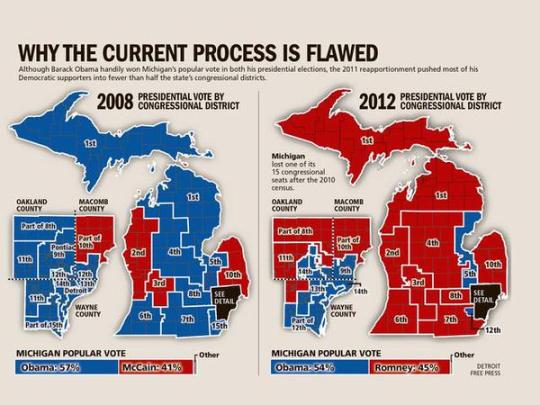
Fox News, which had been carrying the remarks live, dropped its feed of the rally after the expletives uttered by the president’s son aired uncensored.
Donald Trump Jr. speaks Wednesday, Jan. 6, 2021, in Washington, at a rally in support of President Donald Trump called the “Save America Rally.” | Jacquelyn Martin/AP Photo
01/06/2021 11:48 AM EST
Link Copied
President Donald Trumps eldest sons threatened Republican lawmakers at a large rally outside the White House on Wednesday, pledging that their family would continue to dispute the results of the 2020 election just hours before Congress was set to certify President-elect Joe Bidens Electoral College victory.
To those Republicans, many of which may be voting on things in the coming hours: You have an opportunity today, Donald Trump Jr. told the crowd gathered for the Save America March on the White House Ellipse. You can be a hero, or you can be a zero. And the choice is yours. But we are all watching. The whole world is watching, folks. Choose wisely.
Several House Republicans and roughly a dozen senators have announced plans to object to individual states electoral vote counts when Congress meets for a joint session this afternoon. And though their effort to reverse the elections outcome has virtually no chance of succeeding, the president had applied increasing public pressure on Vice President Mike Pence who will preside over the proceedings to attempt to thwart Bidens win.
Recommended Reading: Are There Any Republicans For Impeachment
source https://www.patriotsnet.com/how-did-republicans-do-in-the-primaries/
0 notes
Link
MIAMI — A little-known GOP candidate in one of Florida’s most competitive congressional seats was secretly recorded threatening to send “a Russian and Ukrainian hit squad” to a fellow Republican opponent to make her “disappear.”
During a 30-minute call with a conservative activist that was recorded before he became a candidate, William Braddock repeatedly warned the activist to not support GOP candidate Anna Paulina Luna in the Republican primary for a Tampa Bay-area congressional seat because he had access to assassins. The seat is being vacated by Rep. Charlie Crist (D-Fla.), who is running for governor.
“I really don't want to have to end anybody's life for the good of the people of the United States of America,” Braddock said at one point in the conversation last week, according to the recording exclusively obtained by POLITICO.
“That will break my heart. But if it needs to be done, it needs to be done. Luna is a f---ing speed bump in the road. She's a dead squirrel you run over every day when you leave the neighborhood.”
Reached by text message, Braddock refused to say whether he made any threats about Luna to the person who recorded him, Erin Olszewski.
This is a modal window. This modal can be closed by pressing the Escape key or activating the close button.
Share: Secret recording: Florida Republican threatens Russian-Ukranian ‘hit squad’ after rival
FacebookGoogle+LinkedInPinterestTumblrTwitter
Direct Link
https://www.politico.com/news/2021/06/17/secret-recording-florida-republican-threat-hit-squad-494976
Start From
hh:mm:ss
Embed Code
<iframe src='//players.brightcove.net/1155968404/r1WF6V0Pl_default/index.html?videoId=6259286704001' allowfullscreen frameborder=0></iframe>
Close Modal Dialog
Asked repeatedly via text if he mentioned Russian-Ukrainian hit squads, Braddock wouldn’t give a yes or no answer, saying he had not heard the recording and that it’s “allegedly me … there is no proof of that.” He also suggested the recording “may even be altered and edited.”
“This is a dirty political tactic that has caused a lot of people a lot of stress and is completely unnecessary,” he said.
Olszewski denied editing or altering the recording. She said she made it because she was concerned about Braddock’s “unhinged” dislike of Luna that he had previously expressed. After she made the recording just after midnight last Wednesday, she promptly turned it over to St. Petersburg, Fla., police and gave a heads-up to her friend Luna, who filed a petition for an injunction against Braddock. Luna and Olszewski each received a temporary restraining order against him last week. Braddock filed to run Monday.
In the recording, Braddock early in the call brought up the alleged assassins. He also made rambling statements about getting financial help from fellow Freemasons or by somehow importing millions of dollars from Malta and Gibraltar.
“I have access to a hit squad, too, Ukrainians and Russians,” he said about three minutes into the call, adding “don't get caught out in public supporting Luna. … Luna’s gonna go down and I hope it's by herself.”
Braddock went on to explain that he didn’t think Luna could win in the general election. Luna, an Air Force veteran and former model who went on to become a conservative activist, won a crowded GOP primary in the state’s 13th Congressional District last year but lost the general election to Crist.
It's unclear exactly why Braddock has such dislike toward Luna. The two do not appear to have any previous connection to one another, and Braddock is a lower-tier candidate in an increasingly crowded race for Crist’s seat. Already, two state lawmakers and a former Obama administration official have entered the race, with others expected to jump in.
The threats, claims of assassins and political backstabbing put an only-in-Florida stamp on what was already shaping up to be a wild midterm of congressional races. Republican Rep. Matt Gaetz in the Panhandle is still batting back accusations in an ongoing federal sex trafficking probe.
Democratic Rep. Val Demings is leaving her Orlando seat to run for Senate, causing a mad scramble to replace her. And the state is getting an additional congressional seat that is certain to lead to another crush of candidates after redistricting before next year’s elections.
MOST READ
Anna Paulina Luna stands on a podium at a rally for then-President Donald Trump.
In secret recording, Florida Republican threatens to send Russian-Ukrainian ‘hit squad’ after rival
Manchin moves shake up Dem strategy for massive elections bill
Trump rails against Covid vaccines for ‘very young people’
GOP hands Dems a new line of attack: They're for 'Trump over the cops'
New York’s mayoral race remains a tossup after final Democratic debate
Olszewski, who initiated and recorded the call just after midnight on June 9, said she phoned Braddock at his insistence because he kept trying to get her to appear on a health care panel for an event he was organizing.
Olszewski, a nurse by training, became a conservative figure last year after penning a book called “Undercover Epicenter Nurse: How Fraud, Negligence, and Greed Led to Unnecessary Deaths at Elmhurst Hospital,” which some in the health care industry have called disinformation.
After having a few conversations with Braddock, however, Olszewski said she became concerned that he wanted to use her to advance his candidacy and that he left her “threatening” messages about Luna that sounded “unhinged.”
With such a closely divided Congress currently in Democratic control, Braddock said on the recorded call that the “pivotal” St. Petersburg-based district will take on outsized importance in 2022 to keep America from devolving into a “communist-socialist s---hole.” When Olszewski asked him why he had Russians at the ready, Braddock indicated they were to stop Luna.
“My polling people are going to charge me $20,000 to do a poll right before the primary. And if the poll says Luna’s gonna win, she’s gonna be gone. She's gonna disappear,” Braddock said in the recorded call, pledging Olszewski to secrecy. “For the good of our country, we have to sacrifice the few. … For the better or the good of the majority of the people, we've got to sacrifice the few.”
Later in the call, Olszewski asked what would happen if “Luna is gonna win” and Braddock assured her that wouldn’t happen.
��She’s gonna be gone. Period. That's the end of the discussion. Luna is not an issue,” he said.
Olszewski pushed him, asking “how do we make her go, though? I just don’t understand that.”
“I call up my Russian and Ukrainian hit squad, and within 24 hours, they're sending me pictures of her disappearing,” he replied. “No, I'm not joking. Like, this is beyond my control this point.”
Advertisement
Advertising Helped Destroy the Environment. Can It Help Save It?
SPONSORED BY FCB GLOBAL
Our job now is to create intrinsic value, and profit, while using fewer resources
See More
Asked if the killers were snipers, Braddock described them as, “Russian mafia. Close-battle combat, TEC-9s, MAC-10s, silencers kind of thing. No snipers. Up close and personal. So they know that the target has gone.”
Olszewski said that threats like the ones Braddock made “you can’t take lightly. Normal people don’t say these things.”
Olszewski called Braddock on one smartphone and recorded video of the call with another, occasionally displaying his name and number on the video to show it was him on the call. POLITICO also obtained a separate recording, a voicemail message, Braddock left with a consultant in which his phone number was identical and voice seemed to match the information Olszewski shot in her video.
In Florida, it’s a third-degree felony to record another person without their knowledge. But Olszewski said that St. Petersburg police told her she had nothing to worry about in recording the conversation and turning it over to authorities. A spokesperson for the St. Petersburg police declined to comment on the recording or whether it was legally recorded.
Braddock, though, indicated he was ready to sue Olszewski.
“The folks in possession of whatever recording they think they have of myself or someone else (which may even be altered and edited) will be facing civil damages suit(s) when the paperwork is file [sic] with the county and felony charges after I file with the local police department,” Braddock said in his text message to POLITICO. “I strongly advise not to get involved because the civil suits will continue to be filed until people stop sharing them because whomever is on the recording did not consent to be recorded in my humble opinion.”
In her filing for an injunction, Luna also mentioned how Braddock claimed in the call with Olszewski that two other potential Republican candidates in the race, Amanda Makki and Matt Tito, had formed an alliance with him to stop Luna. Braddock briefly posted the petition for the injunction on his Facebook page Friday but then took them down.
Both Makki and Tito denied the claims of an alliance with Braddock and each of them criticized Luna for mentioning their names in the injunction she filed against Braddock.
“The fact she dragged me through the mud, after not seeing or talking to me after 11 months, it really calls into question her judgment,” said Makki, who ran unsuccessfully in the GOP primary against Luna in 2020, despite earning the endorsement of House Minority Leader Kevin McCarthy.
Tito, also, was displeased with the fact that he was named in the injunction.
“This is a total political hit job. I wasn’t served. I’m not in legal trouble,” he said. “Luna doesn’t want me to get in the Republican race because she knows I’ll beat her. I’m a better candidate. She’s trying to wipe me out of the race, trying to embarrass me, intimidate me, smear my name so she has a wider path to the nomination.”
In the call, Braddock mentioned that he offered Tito a job on his campaign to keep him on the sidelines, but Tito said he had no intention to work for Braddock.
James Blair, a spokesperson for Luna, said she wouldn’t comment on the ongoing investigation. But he suggested Makki had “sour grapes” for losing the primary last year to Luna. And he faulted Tito because he “immediately blamed the woman” by accusing Luna of a political hit job.
“The content of the protective order filed is based upon Mr. Braddock’s own threats, actions, and statements,” Blair said. “I understand that Mr. Braddock is the one who stated he is working with Mr. Tito and Ms. Makki, so perhaps they should take it up with him instead of attacking the person he said he was going to kill if that’s what it took to keep her from winning.”
In her petition for the restraining order, Luna made it clear that she took Braddock’s threats seriously.
“I do not feel safe and am currently in fear for my life,” Luna wrote, according to a copy of it.
Olszewski, too, said Braddock sounded dangerous. At one point, Braddock even said he was scared himself.
“Don’t be on the f---ing wrong side of supporting Luna because if you're near her when the time comes, I just don't want that to happen to you because you've got kids,” Braddock said on the call. “So don't be associated with Luna under any circumstances. Please. And do not repeat this anybody because both of us will be in jeopardy if you do. I'm not just blowing smoke here. I'm f---ing being dead ass serious and it scares the s--- out of me, too.”
“The content of the protective order filed is based upon Mr. Braddock’s own threats, actions, and statements,” Blair said. “I understand that Mr. Braddock is the one who stated he is working with Mr. Tito and Ms. Makki, so perhaps they should take it up with him instead of attacking the person he said he was going to kill if that’s what it took to keep her from winning.”
In her petition for the restraining order, Luna made it clear that she took Braddock’s threats seriously.
“I do not feel safe and am currently in fear for my life,” Luna wrote, according to a copy of it.
Olszewski, too, said Braddock sounded dangerous. At one point, Braddock even said he was scared himself.
“Don’t be on the f---ing wrong side of supporting Luna because if you're near her when the time comes, I just don't want that to happen to you because you've got kids,” Braddock said on the call. “So don't be associated with Luna under any circumstances. Please. And do not repeat this anybody because both of us will be in jeopardy if you do. I'm not just blowing smoke here. I'm f---ing being dead ass serious and it scares the s--- out of me, too.”
FILED UNDER: CHARLIE CRIST, TAMPA, LEGAL
0 notes
Link
“When the debate is lost, slander becomes the tool of the loser” ~~~ Socrates
When a spoiled little kid loses in a board game, he grabs the board from beneath and throws it up into the air, pulls a temper tantrum, and walks away shouting; “I won, you cheated”!
Donald Trump is a 7yr old spoiled uneducated little brat, born with a silver spoon stuck up his derriere, and dressed up as a 74yr old stable genius …well, this stable genius is going to have to deal with the reality that the 4 year run of his “Reality Show” has been canceled due to low bad ratings!
This little sore losing cry-baby will never concede! He isn’t man enough to ever say; “I lost, congratulations, You won”! That would be way too much for his ultra-narcissistic fragile ego to absorb.
His eventual eviction and exit, stage right, from the White House is January 20th. Meanwhile, he’s been trying to overturn the Election using his eternal book of conspiracy theories of fraud throughout the country, and every legal trick available.
Projecting all this massive fraud, just reveals how much fraud he must have committed …and how pissed he must be that even if he cheated his ass, off…he still lost!
He’s tried every trick in the book to win the election …including making a Trump club member and big-time political donor, Postmaster General, to steal the Election by screwing all Mail-In Votes…but, that failed. He then tried to intimidate minorities from voting using death threats and suggested his right-wing goon squads browbeat and frighten away Black voters at the polls. That failed too.
When all was lost, he started requesting hand recounts and audits. When that didn’t work, he asked for machine recounts…then, since nothing else worked, he started his inevitable string of lawsuits…62 & counting, and every single one has been dismissed as a farce by every Federal Judge at every level.
They lose, move to the Appeals Court…and lose again. They did it in every State…and kept losing! Pennsylvania’s last straw? The 3 Judges in the Court of Appeals…2 Republicans selected by George Bush and 1 Republican picked by Trump…all 3, pretty much in their own way, told Rudy Giuliani to pack his bags and get the hell out of their Court!
Finally, what has been all along …his ultimate intension…SCOTUS with “His” 3 Judges! Their verdict on PA? 9–0 in favor of Biden.
And it continued. The Attorney General of Texas sued Wisconsin, Michigan, Pennsylvania, and Georgia …asking the US Supreme Court to nullify the Biden votes in those states, by legally trying to interfere with another state and telling them how to run their own elections. In this case, 18 states & 126 GOP Congressmen joined the lawsuit …even advocating sedition, and threatening secession if the election isn’t overturned in their favor!
The end arrived when SCOTUS once again voted 9–0! Biden is the winner, again! Then, to put the nail on the Trump Presidency coffin, three days later, the Electoral College gave Biden his 306 votes …It’s Over! The End! El Fin! Finis!
Oh! He’ll continue to publicly say it was stolen from him till the day he dies! …it’s his new MAGA Cult rallying cry; “They stole my election …destroy the GOP”! And it’s beginning to work …lookout, Republicans!
For a while, It looked like he was willing to dig in, call squatters’ right, hunker in his bunker, and never come out! He’s mellowed recently, probably cause one of his baby handlers rubbed a little Rum on his cry-baby gums, calming his temper tantrums down a little …and making the baby do some things he really doesn’t want to do.
It would’ve been something, though …to see to what extent Donald Trump would go, to stay in the White House!
Imagine! It’s High Noon, January 20th, 2021
Donald Trump is in the back of the White House on top of a giant dumpster completely engulfed in flames, while hysterically laughing and shouting; “Ha! Ha! Top of the World, Ma! …I’m on Top of the World”!
Wonder how Jimmy Cagney (a staunch Republican donor, supporter, & close Reagan friend) must feel looking down from heaven in shame at this total fake of a tough-guy wannabe …and all his ‘tough’ Republican cult of political cowards?
He’s too much a coward to stay inside and yell; “You’re not taking me out alive, coppers”!. He’ll walk away, right onto an 18th Green in one of his Country Clubs …and continue his hateful, racist, rabble-rousing ways! Maybe, start a media empire to compete with the now, “too liberal” Fox News.
Maybe …run for President in 2024 …even, if it’s just to bug the living hell out of humanity all over again!
But primarily, to advance his Trumpism, cause trouble & entice civil unrest using his despicable “good fine people”, and become a thorn on the side and a pain in the derriere of whatever is left of the Grand Old Party.
What’s his endgame? This penniless billionaire is making enough money to survive, pay off his mysterious $400 Million debt, and stay out of jail. Now, he’s defrauding his own donors with his “Trump Election Defense Fund” for the use of overturning the election, by funneling 75% of all the money donated into the new “Save America PAC”, where the money is kept…stashed away for whatever “Trump’s future ambitions and endeavors might be”. It’s no secret, it also means he can legally pocket every penny of those contributions!
All his antics are the last act of a desperate man. All narcissistic psychopaths desperately need and live for the “attention”, to survive. When the party is over, you become yesterday’s news …and when the love is gone, you become nothing …a nobody!
He rarely comes out of the White House much anymore (except to play golf) since being declared “the loser”. Mostly, stays inside his bunker …brooding and tweeting his usual obscenities, complaints, and lies. Slandering people right and left. And every once in a while, if his “good fine people” are outside the gates, he’ll buzz around low & fly-over with the White House Helicopter, or he’ll get into his limo and have the Secret Service drive him through the crowd so he can wave & smile at them while seeing them yell and wave back…it’s his obsessive need for attention. Then, to the end of the block, around the corner…and back into his bunker.
Knowing you’re a worthless human being who doesn’t care about anyone else on the face of this earth but for yourself …and knowing of having 81+ million people agree with you & vote you out? …that hurts!
Leaving historically with a legacy of being publicly shamed as a corrupt Impeached ex-President, a loser who lost by more than 7.5 million votes and lost the popular vote in 2016 by more than 3 million votes!
And finally, never being liked or approved by the majority of America …never even coming close to reaching at least a 50% job approval rating throughout his entire 4-year gig!
He’s been forced out of his tiny little bubble of illusions & delusions …and thrown into the world of reality. Having it all happen publicly, in front of the entire world …and nowhere for the Trump Family and the Trump “brand” to ever hide!
For this little man, the eminent jail time waiting in the wings is not as bad as the shame of facing a public that’s learned the truth about “The Donald”…that he really is a Loser, a Liar, a Cheat, a huge Tax Fraud, and a Penniless Billionaire Con-Artist.
Psychologically projecting himself throughout his life for being the loser he’s always been, by calling everyone else in the world a loser …has caught up with him…and reality is now haunting him, dearly.
The self-proclaimed “King of Reality Shows” was in all his glory in today’s so-called “Reality TV” …it’s really all about what you (the producer) want to “pass” as Real. Like a Trump form of reality; WWE Pro Wrestling with his buddy, Vince McMahon, and the scripted feud between Donny & Vince on TV.
Like Wrestling, it always passes as being “real” …even if you already know it’s all fake! And no one is better than the King of Fake …America’s only ever faux president!
Being the greatest, smartest, and astute billionaire in the world …a stable genius, may all work in Reality TV, but in the real world, it’s transparently obvious he’s not a stable genius, he’s the polar opposite of being the greatest in anything, definitely verified for 4 years he’s not the smartest, and obviously, he’s not an astute billionaire …in fact, just a fraudulent penniless self-proclaimed billionaire.
There’s very little that’s real in reality tv …though, a few are truly legit. Seeing a family literally break-up after years working in business together, and then seeing them slowly make-up was pure classic, true reality …thanks to American Chopper & the Discovery Channel.
And it wasn’t due to the pressure of the constant cameras filming it…this all happened long before the show started. It was going to explode on the show or off the show …and the Discovery Channel caught it!
William Burkett once said; “People fight with reality. They fight it tooth and nail, with everything they’ve got. And anytime you are arguing or fighting with reality, reality will win. You can’t outsmart it. You can’t trick it. You can’t bend it to your will. Not now. Not ever.”
You can’t outsmart reality, Mr. Trump …you lost, and lost big …put-on your big boy pants, act like a real man, and admit defeat!
So, why did Donald Trump lose?
Truth & Reality Matters! Where do you start? His indecent & immoral degenerate character? 4 years of America being embarrassed in front of the world almost every single day?
Let’s start with misinforming and lying to the American Nation 30 seconds after taking the Oath of Office …with over 25,000+ lies from Nov. 8th, 2016 to Nov. 3rd, 2020.
Cheating to get elected with help of Russia’s online mass disinformation program and use of bots …all verified 100% by America’s entire intelligence community & confirmed by a GOP Senate Committee. That’s Treason.
His eternal passion for Schadenfreude, his love for cruelty …keeping children in dog cages, separating them and even ripping them away while still being breast-fed by their mothers, and keeping them away from their families…but mostly, enduring unquestionable cruelty and tragedy throughout the 4 years. That’s totally insanely criminal!
Working with Foreign Countries (Ukraine & Russia) to discredit his political opponent. That’s a Treasonous act.
Running a criminally corrupt administration, using Foreign actors, political racketeering, enriching himself and his political cronies. Committing Fraud, Money Laundering, Embezzling, Political Extortion, Nepotism up the kazoo, and destroying as much as he can of the Constitution’s Emoluments Clause. All that is Life in Prison!
The total outright planned systematic attack on Civil Rights and Equal Justice …openly advocating and promoting Hate & Racism, the Sedition of States, praising QAnon, openly encouraging violence, and fully embracing White Nationalism/Supremacy. Treason! Treason! Treason!
And how about giving away US Classified Information to the Russian Ambassador and the Russian Foreign Minister publicly inside the Oval Office, after kicking everybody out of the room? …that’s pure Electric Chair Treason, any way you cut it!!
Oh, yes! One more little problem facing this country, and the main reason why the not so stable genius, lost …over 16.5+ million Infections and 300,000+ Deaths from a Global Pandemic that he knew all about, back in Dec 2019 & Jan 2020! He knew from the very beginning!
Decided to call it a hoax, very systematically fabricating every move step by step, holding back life-saving measures, and totally misleading the American Public on the grave dangers concerning the state of theirs & their family’s Health…while discrediting Medical Science every step of the way. Purposely “Politicizing” the pandemic, while people keep dying!
And he still fighting it…encouraging all his supporters to gather in mass, like at his super-spreader events, and never wear a mask, which really doesn’t help while trying to control the virus!
And while millions go hungry, and massive lines of cars throughout the entire country lining up and waiting hours to receive food handouts …and the massive lines for COVID-19 testing, that just keeps growing by the day …the President of the United States is out playing golf!
Until Jan. 20th, 2021, he’s still president. Why doesn’t he do something and try to make things just a little better during his last days? Why doesn’t he try acting a little more decent & respectful and do something to help the Health Crisis in this country? …leave a little more dignity, and gracefully? Instead, he’s still acting like a spoiled little cry-baby who doesn’t know how to put on his big boy pants and walk away like a real man …with his head, up!
And then, people really have to ask why Donald Trump lost?!?!
Oddly enough, if he wasn’t so incompetent …if his administration wasn’t so incompetent, and if he really would’ve tried to properly lead the Nation during this very real pandemic crisis, instead of treating dead Americans as “collateral damage” …just a number for economic bean-counters to decide whether to remain open or closed? …if he would’ve been totally honest with the American People? The drama of this pandemic would’ve tilted in his favor, as the hero president who’s leading his country and doing his very best to stop Coronavirus! He may have won!
The biggest reason why Donald Trump lost was Donald Trump!
It’s his dirty, indecent, and immoral degenerate corrupt character, his dirty filthy mind, and his dirty fowl-mouth. But, if he acted like a President whose concerned about his American constituents’ lives if he worked and showed he cared? …he may very well still be President!
Those who first elected him, many thought he’ll take the job seriously, and being a “non-politico”? …they believed in giving him a chance to learn …call it, on the job training!
Well, he never took the job seriously, and he didn’t learn anything from 4 years of “on the job” training! Now, 4 years later, 74 million still voted for Trump? What’s their excuse besides sheer institutionalized systemic ignorance & blind loyalty, if it’s not hatred and racism?
After 4 years, how many people do you have to fool that are still alive from this Pandemic, to keep your job?
The majority of this country already knew, heard, and seen the same spiel this con-artist has pulled for years! …and still, they’ve had no other choice but to put up for 4 years watching our president, openly on LiveTV and in front of the world, literally flip-off America every single day of his presidency!
Before the vote began, he said that he’ll admit defeat if it’s an Electoral Landslide. He called his win in 2016 with 304 electoral votes (2 Trump and 5 Clinton electors voted for others) a landslide victory! Well, Biden ended up with 306, which means, it makes it a slightly bigger landslide, right?
Now, he says he’ll abide by the Electoral College’s decision, but won’t concede? Like everything about the Donald …won’t believe it till I see it! By the way, a caution warning to the permanent White House Staff; When the Trumps move out their personal furniture, keep an eye open …not unusual or above the values for this clan, to pick up a couple 5 finger-discount items that are White House properties.
Well! The American people have spoken, Mr. President. …Bye! Bye! The party’s over, time to call it a night! You’ve been terminated; Now, you don’t have to go home …but you can’t stay here!
Fool me once, shame on you. Fool me twice?!?! …YOU ARE FIRED!
#2020 Elections#Donald Trump#reality#biden/harris#president-elect joe biden#vice-president elect#racial equality#global pandemic#coronavirus deaths#trump lost
0 notes
Photo
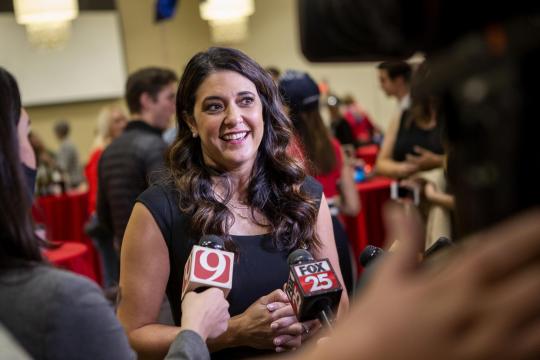
New Post has been published on https://techcrunchapp.com/republicans-exceed-expectations-in-house/
Republicans exceed expectations in House

As election results continued to trickle on Wednesday morning, Democrats were poised to maintain their majority in the U.S. House of Representatives. But Republicans had crushed Democrats’ hopes of significantly expanding their ranks. Democratic lawmakers lost their seats in at least seven districts, while their party failed to defeat a single Republican incumbent.
Going into the night, Democrats had control of the House 232-197, with five open seats and one independent seat. It takes 218 seats to have a majority.
Playing offense in the suburbs against freshman Democrats paid off for Republicans, who managed to retake some of the seats they lost in the 2018 midterm elections. That year, Democrats’ path to a majority led through the suburbs in metro areas trending blue like Orange County, Calif., Northern Virginia, and New York. Democrats also made gains in the metropolitan districts of Atlanta, Houston, and near Oklahoma City. Overall, they captured more than 40 seats in 2018.
This year, polling perhaps made Democrats overly optimistic they would make even more gains. But those polls may have overestimated Democratic chances.
On the campaign trail, the Republican message focused on rebuilding the economy and the threat of Democratic legislation. Democrats, meanwhile, focused on the COVID-19 pandemic and healthcare.
“Our purpose in this race was to win so that we could protect the Affordable Care Act and so that we could crush the virus,” House Speaker Nancy Pelosi, D-Calif., told reporters on election night.
As of Wednesday morning, the GOP had flipped seven seats, some in districts that went to Trump in 2016 but that Democrats had picked up in 2018. These victories included Oklahoma’s 5th Congressional District (Republican challenger Stephanie Bice beat Democratic Rep. Kendra Horn), New Mexico’s 2nd District (Democratic Rep. Xochitl Torres Small lost to Republican Yvette Herrell), and the 26th District in Florida (Rep. Debbie Mucarsel-Powell lost to Miami-Dade County Mayor Carlos Giménez.)
Republicans also wrested control from some longer-term incumbents. Rep. Collin Peterson, a rare pro-life Democrat in a deep red district in Minnesota, lost to Republican Michelle Fischbach, ending Peterson’s almost 30 years in Congress. In Florida’s 27th District, Democratic Rep. Donna Shalala lost to Republican challenger Maria Elvira Salazar. Virginia’s 5th District was also touted as a toss-up, but Republican Bob Good led Democrat Cameron Webb throughout the night and ultimately captured the seat.
Republicans also seemed poised to capture New York’s 11th District from embattled freshman Democrat Rep. Max Rose and its 22nd District from Democratic Rep. Anthony Brindisi.Democrats hoped to make gains particularly in Ohio, North Carolina, Virginia, and Texas. As of Wednesday morning, Democrats had flipped only two seats. They gained North Carolina’s 2nd and 6th districts, made more friendly to Democrats after court-ordered redistricting.
Of course, there are still many House races—over 50—that remain uncalled.
In a statement, Pelosi stressed the number of ballots that hadn’t been counted. “We have held the House and now, when after all the votes are counted—we’ll see how much better we will do than that,” she said. “There’s more to come.”Many incumbents from both sides of the aisle easily cruised to reelection, including progressives Reps. Alexandria Ocasio-Cortez, D-N.Y., and Ilhan Omar, D-Minn.
There were other noteworthy though unsurprising results: Ritchie Torres in New York’s 15th District will become Congress’ first openly gay Hispanic lawmaker. In New York’s 17th District, Mondaire Jones will become Congress’ first openly gay black lawmaker. In Iowa, Republican state Sen. Randy Feenstra easily beat Democrat J.D. Scholten to maintain GOP control of former Rep. Steve King’s seat. In North Carolina’s 11th District, Madison Cawthorn will become the youngest House member in modern history and fill the seat White House chief of staff Mark Meadows vacated. Marjorie Taylor Greene, who made waves for supporting the QAnon conspiracy theory (see below), won an open seat in Georgia.
Most pollsters gave Democrats a high likelihood of gaining up to 20 seats and said Republicans would do well to simply keep Democrats’ gains to single digits. The nonpartisan Cook Political Report on Monday predicted Democrats would capture 10 to 15 seats, perhaps even more.
“The House battlefield has steadily moved towards Democrats all cycle. And much like 2008, Speaker Nancy Pelosi could expand her party’s newly won majority by double digits,” Dave Wasserman had written. He noted that the combination of President Donald Trump’s unpopularity in the suburbs, a fundraising advantage for Democrats, and Republicans’ challenge of defending 32 open seats made it a tough uphill battle for the GOP.
In 2018, Democrats interpreted their blue wave as a clear repudiation of Trump’s first-term agenda. They then coalesced around a largely symbolic agenda to show Americans how they would govern if they won control of the presidency and the Senate. They passed aggressive bills that had no chance of making it through the Senate, including measures to rework voting and campaign finance laws, bolster gay and transgender rights, and drastically overhaul environmental laws.
The biggest legacy of the Democratic House majority of the 116th Congress is its impeachment of the president. Senate Republicans swatted down that effort, acquitting Trump.
Several Senate races remained undecided Wednesday morning, but Democrats appeared unlikely to wrest the Senate from GOP control. That would mean House Speaker Pelosi faces two more years of shepherding largely symbolic legislation through her own chamber—or finding areas of compromise.
Even if Democratic presidential nominee Joe Biden wins the White House, it is unlikely he’ll be able to pass aggressively partisan legislation as long as control of Congress remains divided. Last week, for instance, the candidate promised in an interview with Philadelphia Gay News that he would sign the Equality Act, which the House passed last May. The bill would expand the Civil Rights Act and the Fair Housing Act to include sexual orientation and gender identity as protected classes and shift the definition of public accomodations. It would have vast repercussions for religious liberty disputes and would essentially gut the Religious Freedom Restoration Act.
One of the first priorities of the new Congress, regardless of how Election Day results shake out, will be putting another COVID-19 relief bill to bed. After weeks of negotiations that ended in a stalemate, Pelosi and Treasury Secretary Steven Mnuchin will have to restart talks during Congress’ lame duck session.
In the new Congress, Pelosi may remain focused on the agenda she has previously outlined for the House. It includes creating a path to citizenship for some young illegal immigrants, lowering the cost of prescription drugs, and increasing federal spending on infrastructure projects.
But if Republicans gain seats, she will have to contend with a stronger and emboldened Republican minority.
“We defied the odds. It’s the night of the Republican women,” House Minority Leader Kevin McCarthy told Politico Wednesday morning. “The Democrats never solved one problem in their majority. They promised they would govern differently, and they didn’t.”
!function(f,b,e,v,n,t,s) if(f.fbq)return;n=f.fbq=function()n.callMethod? n.callMethod.apply(n,arguments):n.queue.push(arguments); if(!f._fbq)f._fbq=n;n.push=n;n.loaded=!0;n.version='2.0'; n.queue=[];t=b.createElement(e);t.async=!0; t.src=v;s=b.getElementsByTagName(e)[0]; s.parentNode.insertBefore(t,s)(window,document,'script', 'https://connect.facebook.net/en_US/fbevents.js'); fbq('init', '1775095315845762'); fbq('track', 'PageView'); (function(d, s, id) var js, fjs = d.getElementsByTagName(s)[0]; if (d.getElementById(id)) return; js = d.createElement(s); js.id = id; js.src = "https://connect.facebook.net/en_GB/sdk.js#xfbml=1&version=v2.8"; fjs.parentNode.insertBefore(js, fjs); (document, 'script', 'facebook-jssdk'));
0 notes
Text
Is The House Democrats Or Republicans
New Post has been published on https://www.patriotsnet.com/is-the-house-democrats-or-republicans/
Is The House Democrats Or Republicans

House And Senate Odds Preview
Should Democrats or Republicans be optimistic for midterm elections?
In 2020, the market expectation was a Democratic sweep of the three elected positions, and while it took two months and quite a lot of Georgia-based panic, Democrats did sweep the Presidency, Senate control, and House control, albeit by nowhere close to the margins they were expected to. This time around, the question is whether or not the GOP can gain one or both of those chambers again, and whether or not the PredictIt odds for any of the four possible combinations provides any value.
There are four possible combinations either party to control both chambers or one party to control either chamber.
In theory, if these were independent events, any of those four combinations would be equally as likely as each other, but given politics are correlated, you see thats not really the case. A GOP sweep of both chambers is the favorite at $0.45, which makes sense, given the widespread narrative that the GOP are favorites because of history and the way midterms generally go badly for the party of the Presidency.
However, Donald Trump did win Senate seats in his only midterm, and that same historical argument would have suggested Republicans would romp home easily in Georgia in January.
If you are a Democratic optimist, then the $0.29 on split government a Democratic Senate and a Republican House or the $0.21 on Dem unified control might be appealing.
Poll Finds Startling Difference In Vaccinations Among Us Republicans And Democrats
A Washington Post-ABC News poll has found a startling difference between Democrats and Republicans as it relates to COVID-19;vaccination.;The poll found that while 86% of Democrats have received at least one COVID-19 vaccine shot, only 45% of Republicans;have.
In addition, the survey found;that while;only;6% of Democrats said they would;probably;decline;the vaccine, 47% of Republicans;said they;would;probably not;be inoculated.;
The poll also found that;60% of unvaccinated Americans believe the U.S. is;exaggerating;the dangers of;the;COVID-19;delta variant,;while;18% of the unvaccinated say the government is accurately describing the variants risks.
However, 64% of vaccinated Americans believe the government is accurately describing the dangers of the;delta variant.
Iran fighting COVID 5th wave The variant is having a;global impact.;Irans;President;Hassan Rouhani;has warned that the country is on the brink of a fifth wave of;a COVID-19 outbreak.;The;delta variant of the virus, first;identified;in India, is;largely;responsible;for the;rising number of hospitalizations and deaths in Iran, officials say.
All;non-essential businesses have been ordered;closed;in 275 cities, including Tehran, the capital.;Travel has also been restricted between cities that are;experiencing;high infection rates.
Reports say only about 5% of Iranians have been vaccinated.;
Oregon House Republicans Say Theyre At Impasse Over Democrats Redistricting Plan
Oregon lawmakers, shown here during a January 2021 swearing-in ceremony, are set to meet at the Capitol Monday to approve new legislative and congressional district lines that will determine how voters are represented for the next decade in Salem and Washington, D.C. House Republicans’ leader on Thursday said her caucus would not support Democrats’ plans.Brooke Herbert/The Oregonian
Oregon Democrats congressional and legislative redistricting plans set for a vote in next weeks special session face a roadblock in the state House, where Republican Leader Christine Drazan said on Thursday that her caucus is united in its opposition to Democrats proposed maps.
State lawmakers wrapped up four days of lengthy public hearings on their initial congressional and state legislative district proposals Sept. 13, and they are scheduled to meet Monday for a special session to vote on final plans.
Democrats and Republicans privately discussed potential changes to the Democrats proposed maps over the last couple days. But Democrats, who hold supermajorities in both chambers, had not released any final plans for the public to see until Thursday night.
Under Senate Democrats plans, both chambers would likely continue to have Democratic supermajorities, meaning the party would hold at least 60% of the seats in each chamber, even though Joe Biden only claimed 56% of votes Oregonians cast in the 2020 presidential election.
You May Like: Did Trump Say Republicans Are Stupid
Y Leaders Of The United States House Of Representatives
Party leaders and whips of the United States House of Representatives, also known as floor leaders, are elected by their respective parties in a closed-door caucus by secret ballot. With the Democrats holding a majority of seats and the Republicans holding a minority, the current leaders are Majority Leader Steny Hoyer, Majority Whip Jim Clyburn, Minority Leader Kevin McCarthy and Minority Whip Steve Scalise.
Balance Of Power: 2022 Senate Races

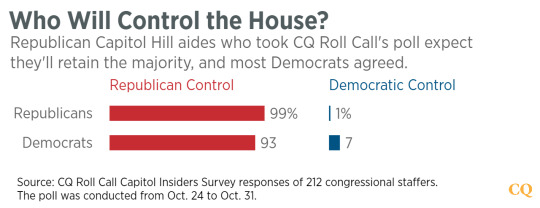
If Democrats want to win the Senate again, they need to win the four competitive seats they currently hold Arizona, Georgia, Nevada, and New Hampshire. That or augment any loss with a gain in any of their three competitive targets Pennsylvania, Wisconsin, or North Carolina.
This Senate preview still holds up, but the shorter version is Democrats are easily favored in Arizona, Georgia, and Nevada. They should also win New Hampshire if Chris Sununu doesnt run .
The thing is, theyre also favored to win in Pennsylvania, where they have a strong field of primary candidates and where Joe Biden won.
They have to be no worse than, and admittedly probably better than, a tossup in Wisconsin, where Republicans have candidate issues and Democrats have a strong likely nominee.
So even if New Hampshire goes Republican because of some local candidate factors, Democrats are in a good spot to win the Senate again.
That means if youre trying to make a bet, you can essentially box out two of four combinations where the GOP wins the Senate, and focus your attention on the two remaining options, if youre looking for the values.
Read Also: How Many Seats Do The Republicans Have In Senate
The Party Thats Actually Best For The Economy
Many analyses look at which party is best for the economy. A study from the National Bureau of Economic Research found that Democratic presidents since World War II have performed much better than Republicans. On average, Democratic presidents grew the economy 4.4% each year versus 2.5% for Republicans.
A study by Princeton University economists Alan Blinder and Mark Watson found that the economy performs better when the president is a Democrat. They report that by many measures, the performance gap is startlingly large. Between Truman and Obama, growth was 1.8% higher under Democrats than Republicans.
A Hudson Institute study found that the six years with the best growth were evenly split between Republican and Democrat presidents.
Most of these evaluations measure growth during the presidents term in office. But no president has control over the growth added during his first year. The budget for that fiscal year was already set by the previous president, so you should compare the gross domestic product at the end of the presidents last budget to the end of his predecessors last budget.
For Obama, that would be the fiscal year from October 1, 2009, to September 30, 2018. Thats FY 2010 through FY 2017. During that time, GDP increased from $15.6 trillion to $17.7 trillion, or by 14%. Thats 1.7% a year.
The chart below ranks the presidents since 1929 on the average annual increase in GDP.
President
1.4%
A president would have better growth if he had no recession.
The Houses Balance Of Power Is Tipped Toward Democrats
The Democrats;have a narrow six-member margin in the current House of Representatives, meaning if just a handful of seats flip, Republicans can regain control of the House.
Democrats;advantage;will grow to seven when Troy Carter is sworn in;to fill a seat in Louisianas delegation left vacant;by Cedric Richmond, who left the House to join the Biden administration as the director of the White House Office of Public Engagement.;
Read Also: Who Controls The Senate Republicans Or Democrats
Census Data Sets Up Redistricting Fight Over Growing Suburbs
The once-a-decade battle over redistricting is set to be a showdown over the suburbs, as new census data showed rapid growth around some of the nations largest cities and shrinking population in many rural counties.
From Texas to Florida, some of the biggest gains reported Thursday came in states where Republicans will control the redistricting process, but often in and around cities where Democrats have been faring well in recent elections.
The new detailed population data from the 2020 census will serve as the building block to redraw 429 U.S. House districts in 44 states and 7,383 state legislative districts across the U.S. The official goal is to ensure each district has roughly the same number of people.
But many Republicans and Democrats also will be trying to ensure the new lines divide and combine voters in ways that make it more likely for their partys candidates to win future elections, a process called gerrymandering. The parties successes in that effort could determine whether taxes and spending grow, climate-change polices are approved or access to abortion is expanded or curtailed.
Black Democrat Collective To Challenge House Republicans
Democrats take House, Republicans keep Senate in historic midterms
A growing group of Black Democrats mostly men is stepping up to try to unseat Republican House members in California, Georgia, Arizona, North Carolina and Illinois.
Why it matters: Although independent analysts like the Cook Political Report think the members’ districts are friendly GOP territory, a Black political group backing the challengers believes the candidates have a chance because of their local ties and the districts’ changing demographics.
Stay on top of the latest market trends and economic insights with Axios Markets.
The backdrop: So far, nine Black Democrats are running to challenge Republicans in these states, but The Collective PAC tells Axios that number will grow by five or more. All but one is a Black man.
What they’re saying: “Our mission is about building Black political power,” said Kevin Olasanoye, The Collective PAC’s political director. It works to ensure equal Black representation at all levels of government.
Between the lines: These campaigns are still in their early stages and the candidates haven’t even conducted polling to find particular vulnerabilities in their Republican opponents.
What to watch: The Collective said it doesn’t intend to get involved in primary challenges to any sitting CBC members, including the one being mounted by Kina Collins against Rep. Danny Davis in Ill.-7.
That said, the group isn’t ruling out getting involved in other Dem-on-Dem primaries, Olasanoye said.
You May Like: Did Trump Say Republicans Are Stupid
Composition Of The Us House Of Representatives By Political Party Affiliation For The 116th Congress In 2019 By State
Characteristic
You need a Single Account for unlimited access.
Full access to 1m statistics
Incl. source references
Available to download in PNG, PDF, XLS format
You can only download this statistic as a Premium user.
You can only download this statistic as a Premium user.
You can only download this statistic as a Premium user.
As a Premium user you get access to the detailed source references and background information about this statistic.
As a Premium user you get access to background information and details about the release of this statistic.
As soon as this statistic is updated, you will immediately be notified via e-mail.
and make my research life easier.
You need at least a Single Account to use this feature.
The Number Of People Each House Member Represents Will Change
The number of residents represented by each House member will mostly grow;in 2022, though it will decrease per representative in some states.;
Since Montana gained a representative, its two House members will now split the states population currently represented by Rep. Matt Rosendale, a Republican. The addition of another House seat means Montanas House members will represent the least amount of people compared to House members in other states.
Delawares sole House district, currently held by Democratic Rep. Lisa Blunt Rochester, will be the largest in terms of population.
Recommended Reading: Did Trump Call Republicans Stupid In 1998
With Control Of White House And Congress Democrats Have 2 Years To Make Big Changes
Sorry, but your browser cannot support embedded video of this type, you can to view it offline.
U.S. Democrats secured unified control of the White House and Congress on Wednesday with the inauguration of President Joe Biden followed by Vice President Kamala Harris swearing in three new Democratic senators.
The three new senators bring the U.S. Senate to a 50-50 Democratic-Republican tie, with Harris as the presiding officer representing the tie-breaking vote.
With the U.S. House continuing under the leadership of Democratic House Speaker Nancy Pelosi, Biden begins his term with the opportunity to work with the two Democrat-controlled chambers to enact significant legislative changes.;
As a result of the shifting political power on Capitol Hill, Senate Democratic leader Chuck Schumer of New York has succeeded Republican Mitch McConnell as Senate majority leader. The Kentucky senator, who served in the top leadership post for six years, was highly skilled at blocking Democratic legislation, as well as advancing former President Donald Trumps judicial and administration nominees through the confirmation process.;
Schumer acknowledged some of those challenges Wednesday in his first speech as majority leader.
This Senate will tackle the perils of the moment: a once-in-a-generation health and economic crisis. And it will strive to make progress on generations-long struggle for racial justice, economic justice, equality of opportunity and equality under the law, Schumer said.
Y Divisions Of United States Congresses

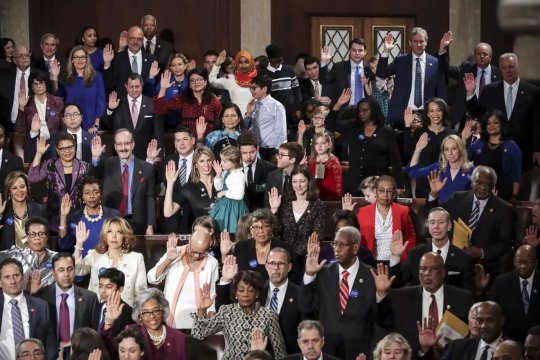
Party divisions of United States Congresses have played a central role in the organization and operations of both chambers of the United States Congressthe Senate and the House of Representativessince its establishment as the bicameral legislature of the Federal government of the United States in 1789. Political parties had not been anticipated when the U.S. Constitution was drafted in 1787, nor did they exist at the time the first Senate elections and House elections occurred in 1788 and 1789. Organized political parties developed in the U.S. in the 1790s, but political factionsfrom which organized parties evolvedbegan to appear almost immediately after the 1st Congress convened. Those who supported the Washington administration were referred to as “pro-administration” and would eventually form the Federalist Party, while those in opposition joined the emerging Democratic-Republican Party.
You May Like: Did Trump Say Republicans Were Dumb
How The Recall Attempt Made It To The Ballot
Although Gov. Gavin Newsoms critics started their recall attempt because they opposed his stances on the death penalty and immigration, it was the politicization of the pandemic that propelled it onto the ballot as Californians became impatient with shutdowns of businesses and classrooms.
Initiated by a retired Republican sheriffs sergeant in Northern California, Orrin Heatlie, the recall was one of six conservative-led petitions that began circulating within months of Mr. Newsoms inauguration.
Initially, Mr. Heatlies petition had difficulty gaining traction. But it gathered steam as the pandemic swept California and Mr. Newsom struggled to contain it. Californians who at first were supportive of the governors health orders wearied of shutdowns in businesses and classrooms, and public dissatisfaction boiled over in November when Mr. Newsom was spotted mask-free at the French Laundry, an exclusive wine country restaurant, after urging the public to avoid gatherings.
A court order extending the deadline for signature gathering because of pandemic shutdowns allowed recall proponents to capitalize on the outrage and unease.
United States House Of Representatives
United States House of Representatives Flag of the U.S. House of Representatives Type Plurality voting in 46 statesVaries in 4 states
The United States House of Representatives is the lower house of the United States Congress, with the Senate being the upper house. Together they compose the national bicameral legislature of the United States.
The House’s composition is established by Article One of the United States Constitution. The House is composed of representatives who sit in congressional districts allocated to each state on a basis of population as measured by the U.S. Census, with each district having one representative, provided that each state is entitled to at least one. Since its inception in 1789, all representatives have been directly elected. The number of voting representatives is fixed by law at 435. If enacted, the DC Admission Act would permanently increase the number of representatives to 436. In addition, there are currently six non-voting members, bringing the total membership of the House of Representatives to 441 or fewer with vacancies. As of the 2010 Census, the largest delegation is that of California, with 53 representatives. Seven states have only one representative: Alaska, Delaware, Montana, North Dakota, South Dakota, Vermont, and Wyoming.
Recommended Reading: How Many Democrats And Republicans Are In The House
I Do Not Buy That A Social Media Ban Hurts Trumps 2024 Aspirations: Nate Silver
sarah: Yeah, Democrats might not have their worst Senate map in 2022, but it will by no means be easy, and how they fare will have a lot to do with the national environment. And as we touched on earlier, Bidens overall approval rating will also make a big difference in Democrats midterm chances.
nrakich: Yeah, if the national environment is even a bit Republican-leaning, that could be enough to allow solid Republican recruits to flip even Nevada and New Hampshire. And then it wouldnt even matter if Democrats win Pennsylvania and Wisconsin.
One thing is for sure, though whichever party wins the Senate will have only a narrow majority, so I think were stuck in this era of moderates like Sens. Joe Manchin and Lisa Murkowski controlling every bills fate for at least a while longer.;
sarah: Lets talk about big picture strategy, then, and where that leaves us moving forward. Its still early and far too easy to prescribe election narratives that arent grounded in anything, but one gambit the Republican Party seems to be making at this point is that attacking the Democratic Party for being too progressive or woke will help them win.
What do we make of that playbook headed into 2022? Likewise, as the party in charge, what are Democrats planning for?
With that being said, the GOPs strategies could still gin up turnout among its base, in particular, but its hard to separate that from general dissatisfaction with Biden.
0 notes
Text
The end of the honeymoon
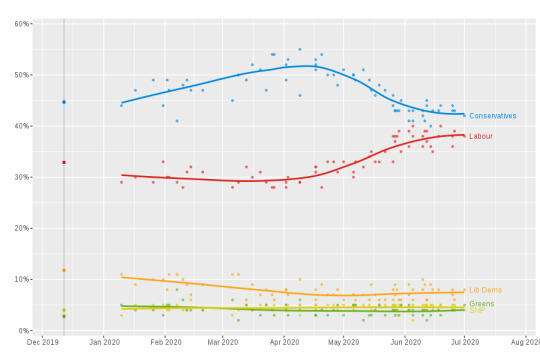
Wikipedia polling chart since GE2019
At some point LAB will take the lead
Labour has not led in any GB poll since 28 July 2019, four days after Boris Johnson succeeded Theresa May as Prime Minister. They did so with a share of just 30%: one more than the Tories and one less than the combined Lib Dem and Brexit Party shares. It seems a lot more than eleven months ago.
Clearly, a huge amount has changed since then but the Tory position at the top of the polls has not. This isn’t all that unusual. Prime ministers usually give their parties a boost on taking office, and parties winning election – especially when they’ve gained seats in doing so – will tend to extend their lead in the aftermath too, which is what happened.
Following the December election, every poll through to late May gave the Tories a double-digit lead, with all bar one of them in excess of the 11.8% advantage at the election. At the peak, in late-March through to mid-April, in the period immediately after the Coronavirus lockdown, the Conservatives routinely led by more than 20% and four times hit 26%.
We should note in passing that Keir Starmer’s election as Labour leader on April 4 didn’t make any great impact on those numbers. Labour’s problems clearly ran well beyond Jeremy Corbyn as an individual and the previous five years have deeply tainted their brand as a party.
From there though, the decline in the Con lead has been marked, falling around 15% in May: from about 20 down to five per cent. There are of course multiple causes of that; Cummings’ bolt to Durham, the Covid-19 death figures, Starmer demonstrably getting a grip on Labour, to name but three. The question now ought to be how long it will be before Labour secure a poll lead?
In truth, it oughtn’t be that long, for three reasons. Firstly, history. We’re approaching seven months since the election. That’s usually around the timespan by which the government falls behind in the polls. Clearly, each parliament is different, faces unique challenges and opts to take different policy choices, and this one has been more unusual than most. Even so, a glance at the record shows a good degree of consistency. These are the periods before the opposition first recorded a lead since 1979:
1979: 7 weeks (first poll of the parliament)
1983: 8 months
1987: 10 months
1992: 3½ months
1997: 3 years, 4 months
2001: 2 years
2005: 7 months
2010: 4½ months
2015: 10 months
2017: 2 days
Obviously, there’s quite a spread there but of those 10 occurrences, four land in the 7-10 month frame, with four below that and two above it. Notably, the four shortest honeymoons were for four of the five smallest majorities (including minority / coalition governments) – 2015 being the exception, another example of Corbyn underperformance. Similarly, the two longest honeymoons were for the government that won the two biggest landslides. On that basis, Johnson ought to be looking at getting on for a year.
However, he might not get there, not least for the second reason: margin of error. The average poll lead is now small enough that it might well only take one outlier to eliminate it entirely. Outliers are, by their nature, rare – and twice as rare for them to be in a particular direction i.e. in this case, pro-Lab. Still, there’s no saying when chance might throw one in.
However, it’s the third factor which is the most potent: political fundamentals. Keir Starmer has a considerable lead over Boris Johnson in terms of favourability, and is more-or-less level in ‘Best PM’ rating. Labour, as mentioned earlier, still has some way to go to win back the public’s trust but against that, the Conservatives have overseen a response to Covid-19 that’s been poor by international standards, and the economic effects of the lockdown are beginning to be felt on a wide spectrum, with job losses being announced regularly. With Covid-19 cases still in the mid-hundreds per day and local lockdowns still a risk, the chances of a V-shaped recovery seem low as even those businesses and other organisations which are in a position to begin recruiting again are likely to be wary in doing so.
The government does still have things going for it politically. The coalition it put together on Brexit isn’t likely to fracture too much while Brexit remains a live issue, as it will through to the end of the year at least. Also, there’s no obvious challenger on the right. The Conservatives retain a much higher floor to their support than they did in 2019.
All the same, I reckon that chances are that Labour will score its first poll lead in around a year before the beginning of September.
David Herdson
from politicalbetting.com https://www7.politicalbetting.com/index.php/archives/2020/07/04/the-end-of-the-honeymoon/
https://dangky.ric.win/
0 notes